A few weeks ago, my husband Will told me that he thought he’d seen a rotten egg in the chicken run, but didn’t know how long it had been there. It was black, and big, but looked like one of the chickens had broken it a while ago.
When I went outside to inspect and clean it up with the kitty litter scoop, I discovered that it was, in fact, a giant black chicken dropping.
Smelly. Hard. And looking like our chicken had been constipated for days.
I opened the coop to see if I could find any more waste bombs in there (because as a chicken-keeper, inspecting droppings happens to be part of the job—lucky us!), and sitting inside her egg box was Iman, our Golden-Laced Cochin.
Her body was sprawled across the entire nest, nearly flattened, and she looked at me with defiance.
It had been a few hours since Will had gone down there and reported her sitting in the nest. She hadn’t laid an egg all week, which led me to believe that our gal had just turned broody again.
Is your chicken acting the same? Here’s what you can do about it.
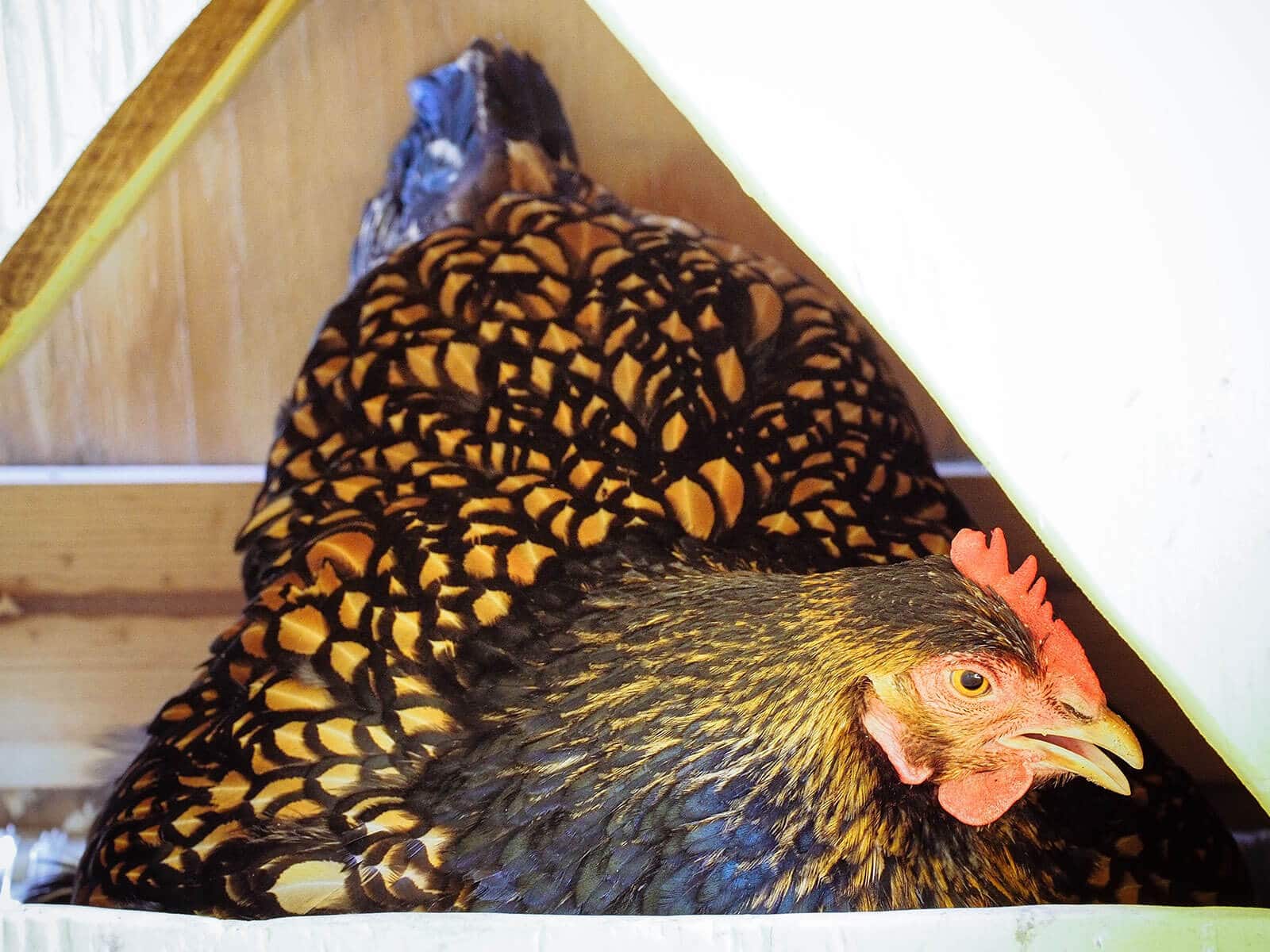
What does it mean when a chicken is broody?
Broodiness is a natural chicken instinct that happens to some chickens every year, and others not at all. It switches on as soon as they’re old enough to lay, between five and eight months old.
Their hormones kick in overtime, much as women’s do when they’re pregnant, and they focus all of their energy into hatching eggs.
The telltale symptom of a broody hen is a sudden display of motherly instinct: sitting on a nest to keep the eggs warm for several hours a day, putting the babies’ needs in front of hers and making sure the eggs are well protected.
This is all fine and dandy if your chicken does have eggs to hatch, but sometimes, a chicken will sit on unfertilized eggs or even imaginary eggs.
Hens raised without roosters can’t lay fertile eggs, but they can still go broody and attempt to sit on a clutch of eggs.
Warm weather and a hormonal imbalance, caused by no doing of the flock owner, will spur a hen to turn broody for weeks on end, waiting for non-existent chicks to hatch.
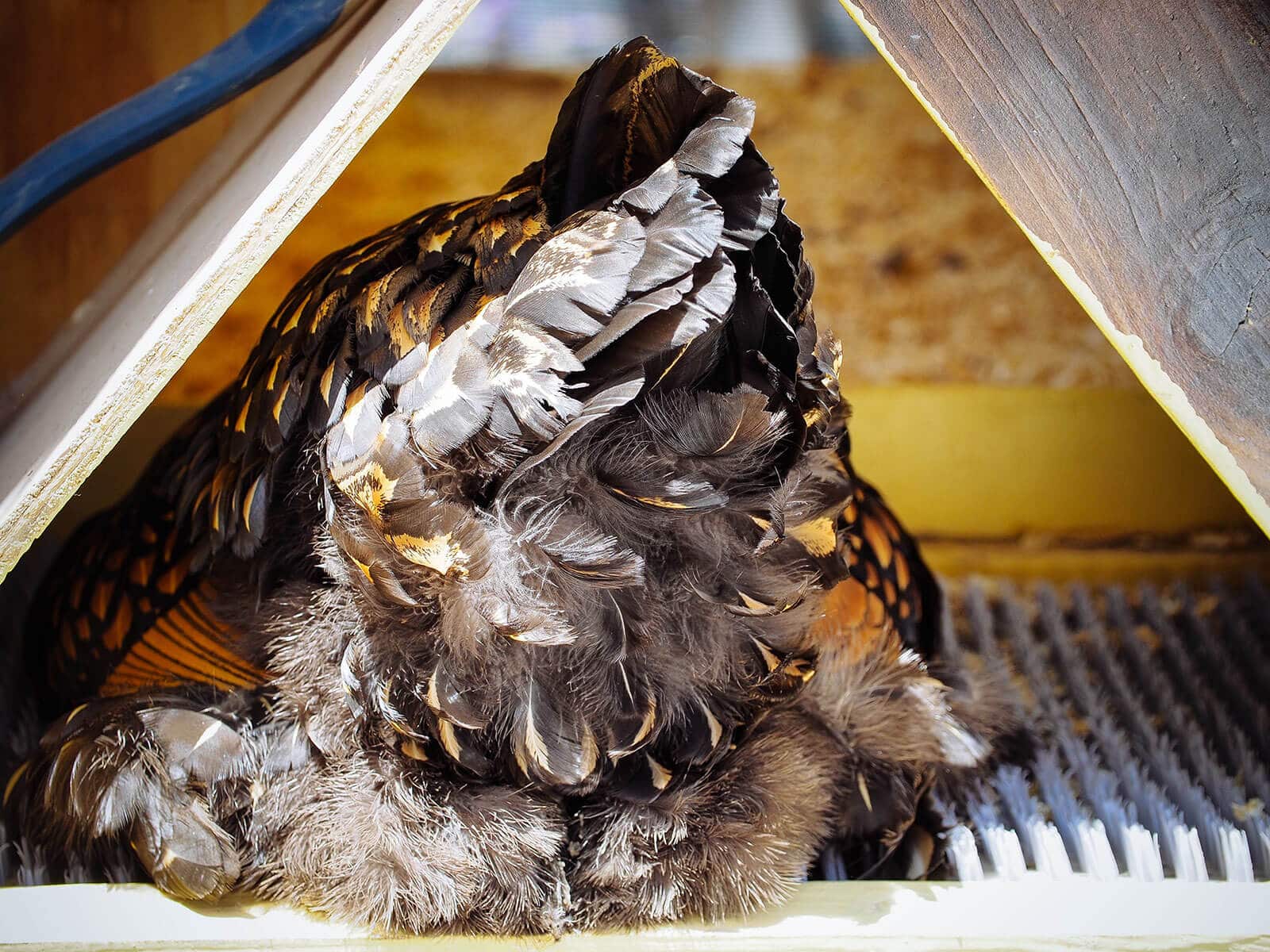
The 6 most broody chicken breeds
Certain breeds of chickens are more broody than others. This is actually good to know if you want to hatch your own eggs every year, but it’s also useful for predicting which hens in your flock may be out of commission each summer.
1. Cochins
Cochins have a strong tendency to turn broody every year during their prime egg-laying years. They are big, fluffy, and sweet, and since they don’t lay as prolifically as other breeds, Cochins make great mothers and pets.
2. Silkies
This petite breed is incredibly docile, almost like the chicken version of a lap dog. They’re probably tied with Cochins for being the broodiest chicken breed, so expect them to take a break from laying when this happens.
3. Buff Orpingtons
Another sweet, lovable bird with a docile personality, Buff Orpingtons have that natural motherly instinct so they’re prone to going broody. Since they also happen to be very productive layers, this is something to watch for in peak season if you depend on a steady supply of eggs.
4. Buff Rocks
The Plymouth Rock breed is one of the most docile breeds (do you see a trend happening here?) and known for following its keepers around. I used to have a Barred Rock that would always try to jump in my lap! But this cuddly tendency is what also makes them more likely to go broody (the Buff Rock hen, in particular).
5. Brahmas
Brahmas are hefty, fluffy chickens with feathered feet. They tend to go broody in early summer, especially if there’s another hen in the flock that goes broody. Brahmas are a great choice if you want a devoted sitter, but because of their size, be sure to watch them after the eggs hatch so they don’t accidentally trample their chicks.
6. Sussex
The Sussex is one of the oldest chicken breeds, and a very friendly and reliable layer. These chickens go broody every year (sometimes quite early) and also make great mothers, so if this is what you want, you can count on them to hatch a clutch of eggs.
The least broody chicken breeds
From personal experience, I’ve raised three different generations of Easter Eggers and none of them have ever gone broody. This is a very active and curious breed, and my Easter Eggers have always been more interested in exploring and foraging than sitting on a nest.
That said, there are other breeds known for either not being broody in general, or just not being very reliable sitters. They may start out broody but abandon their nest soon after, so it doesn’t take much to break these hens from their broodiness.
Non-broody breeds also tend to have a few common characteristics: lightweight, somewhat flighty or skittish, and Mediterranean, Continental, or otherwise non-American classifications. Hybrid layers bred for production (such as black sexlinks and red sexlinks) also rarely go broody.
- Crevecoeur
- Hamburg
- Lakenvelder
- Minorca
- Polish
- Rosecomb
- Sebright
- Sexlink
- Sicilian Buttercup
What are the risks of a hen staying broody?
Even when there are no eggs to sit on, the hen doesn’t realize it. She’ll simply sit and sit, refusing food and water, barely moving from her nest.
Left unattended, a hen will stay broody for around 21 days, which is the time it takes to hatch a clutch of fertile eggs. After 21 days the behavior should stop, but sometimes, a hen will remain broody and it’s important to “break,” or stop a broody hen before she harms herself.
Broodiness is more of a problem for chickens that don’t have fertile eggs to hatch, because a stubborn chicken could make herself malnourished.
It’s unlikely that a broody chicken will starve to death or die in the nest (after all, it’s part of her mama instinct: she won’t do her chicks-to-be any good if she starves herself to death). But she won’t be drinking and eating as much as she normally would, and she’ll lose more weight than she should.
She’ll stop laying eggs the entire time she’s broody. She’ll pull out her own chest feathers in order to produce more body heat for her eggs.
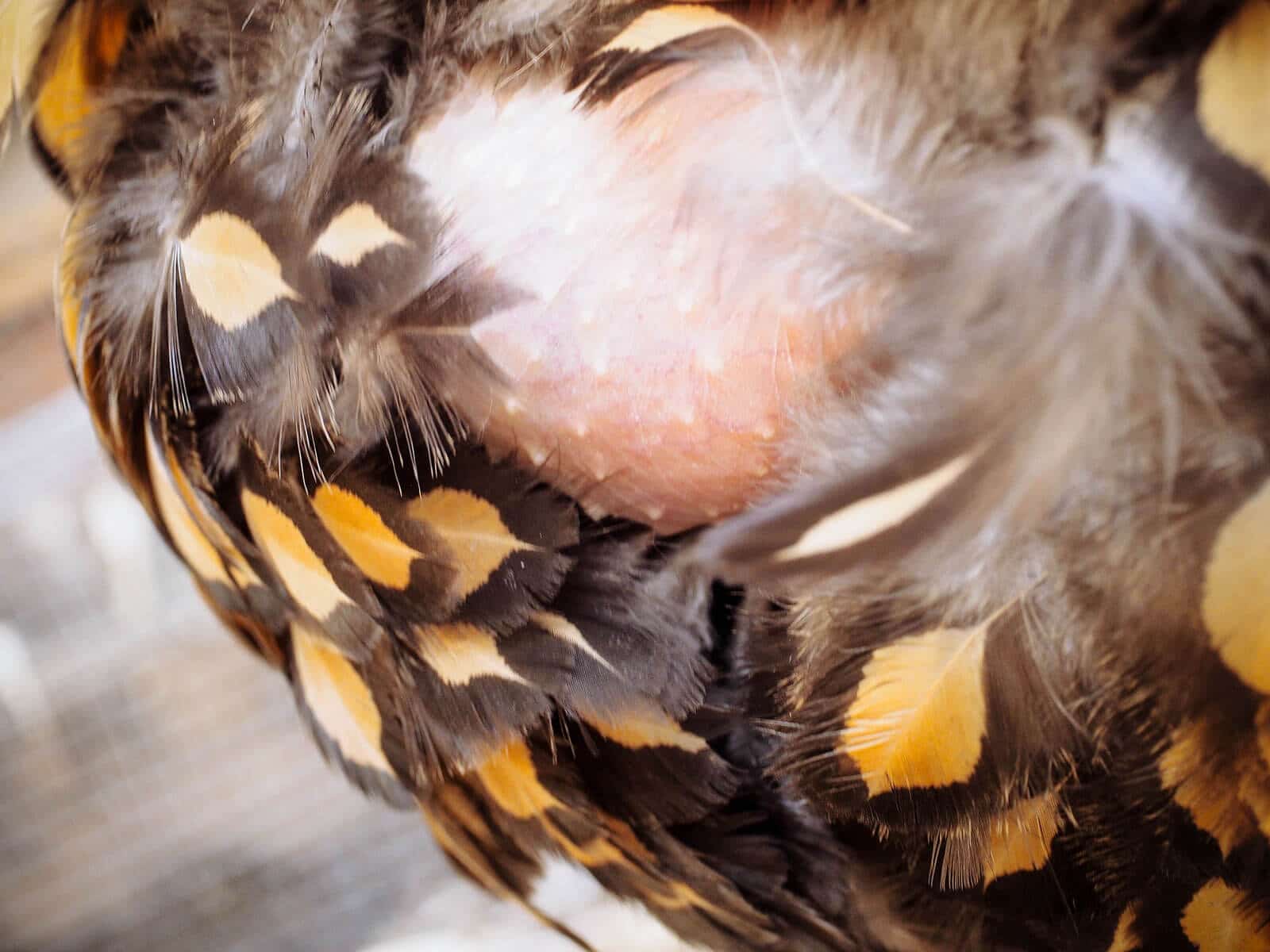
She’ll leave the nest only a couple of times a day to relieve herself, which often results in those big, stinky poops because she’s been holding them in all day.
She’ll also hog the egg box the whole time, leaving little to no room for other chickens to lay eggs. If they come near her, she might peck at them or screech at them.
It’s fascinating how a usually sweet, docile hen will suddenly turn Cruella once her hormones start surging! I call this period of her life “Chicken PMS.”
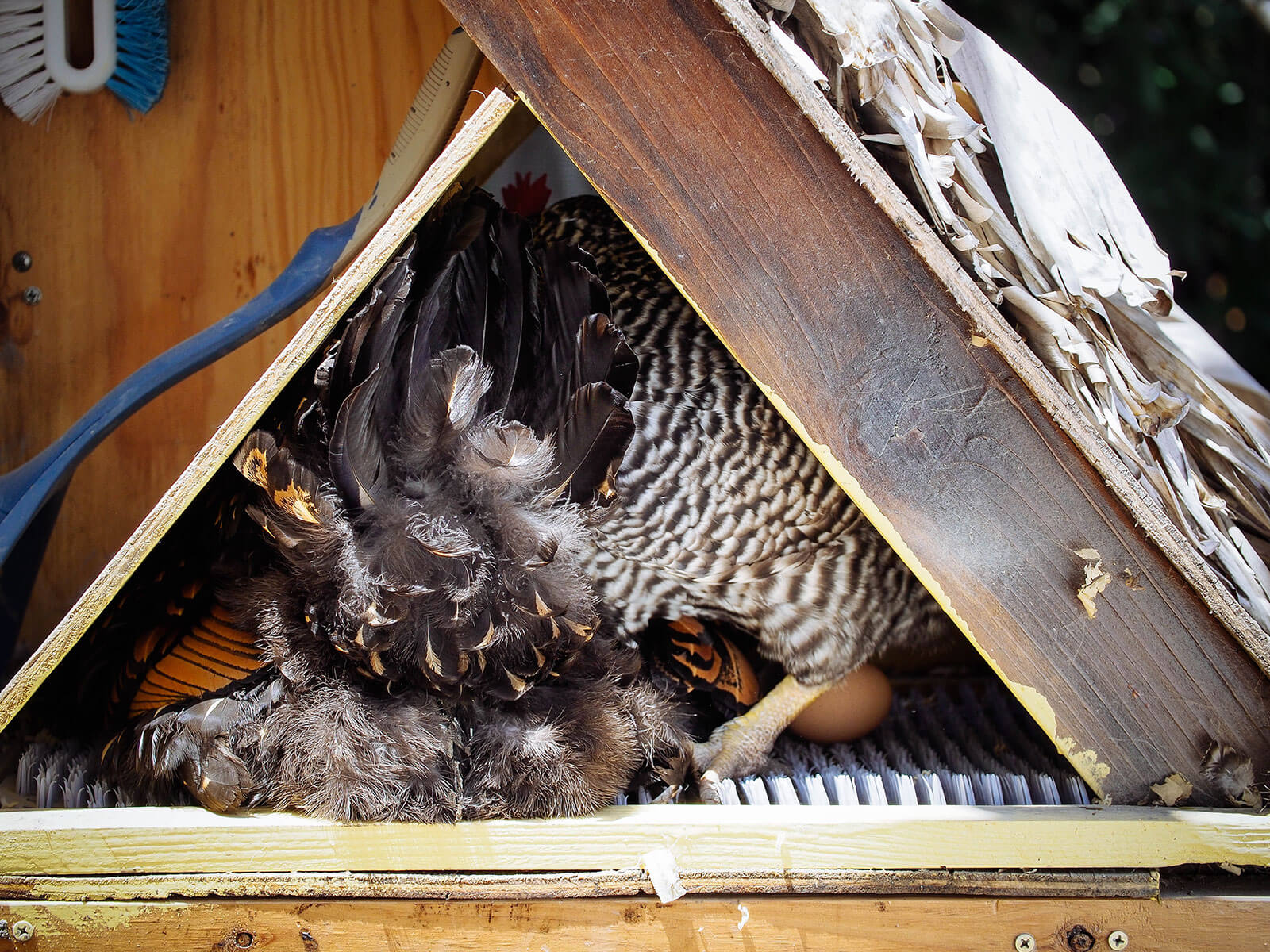
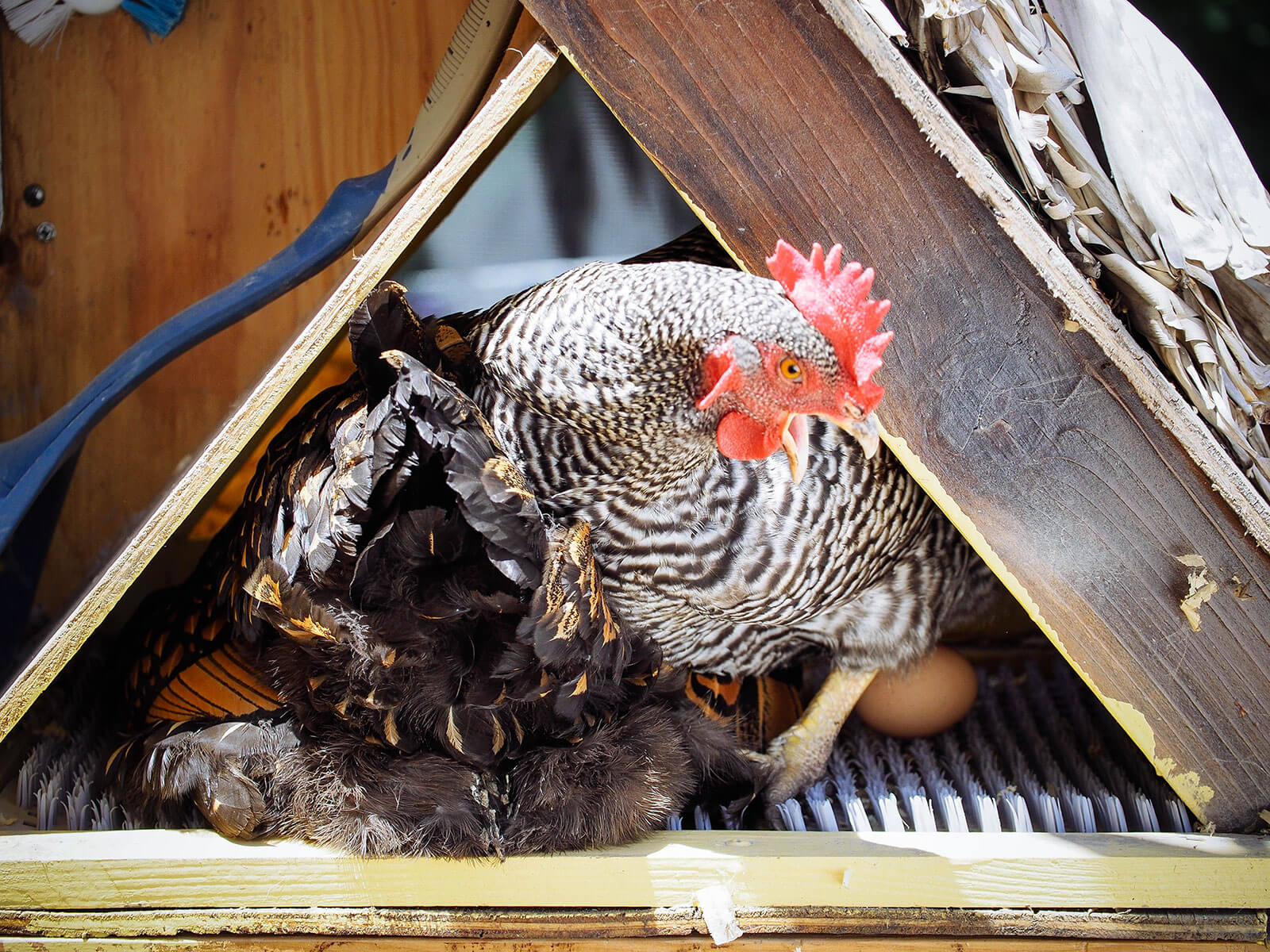
When broodiness goes on for an excessive amount of time, it makes the hen more susceptible to respiratory infections and other diseases because she’ll be too weak to deal with any illness she’s exposed to.
Broody hens are also at risk for getting mites and lice, because they stay in the nest all day where these infestations are common. They aren’t dust bathing and they aren’t outside scratching and pecking, away from bedding material where parasites like to hide.
This is when an easily preventable or treatable problem like mites and lice can turn fatal, as a broody hen will just sit and suffer in her nest.
If your hen turns broody in the height of summer, a poorly designed or poorly ventilated chicken coop could cause the egg box to heat up too much, putting your hen at risk of heat exhaustion.
So you see, there are several reasons to break a broody hen before it’s too late, and there are several ways to snap her out of her mood.
I’ve personally gone through all of these methods and if you need a humane solution, start with the first method and continue going down the list until you successfully break your broody hen.
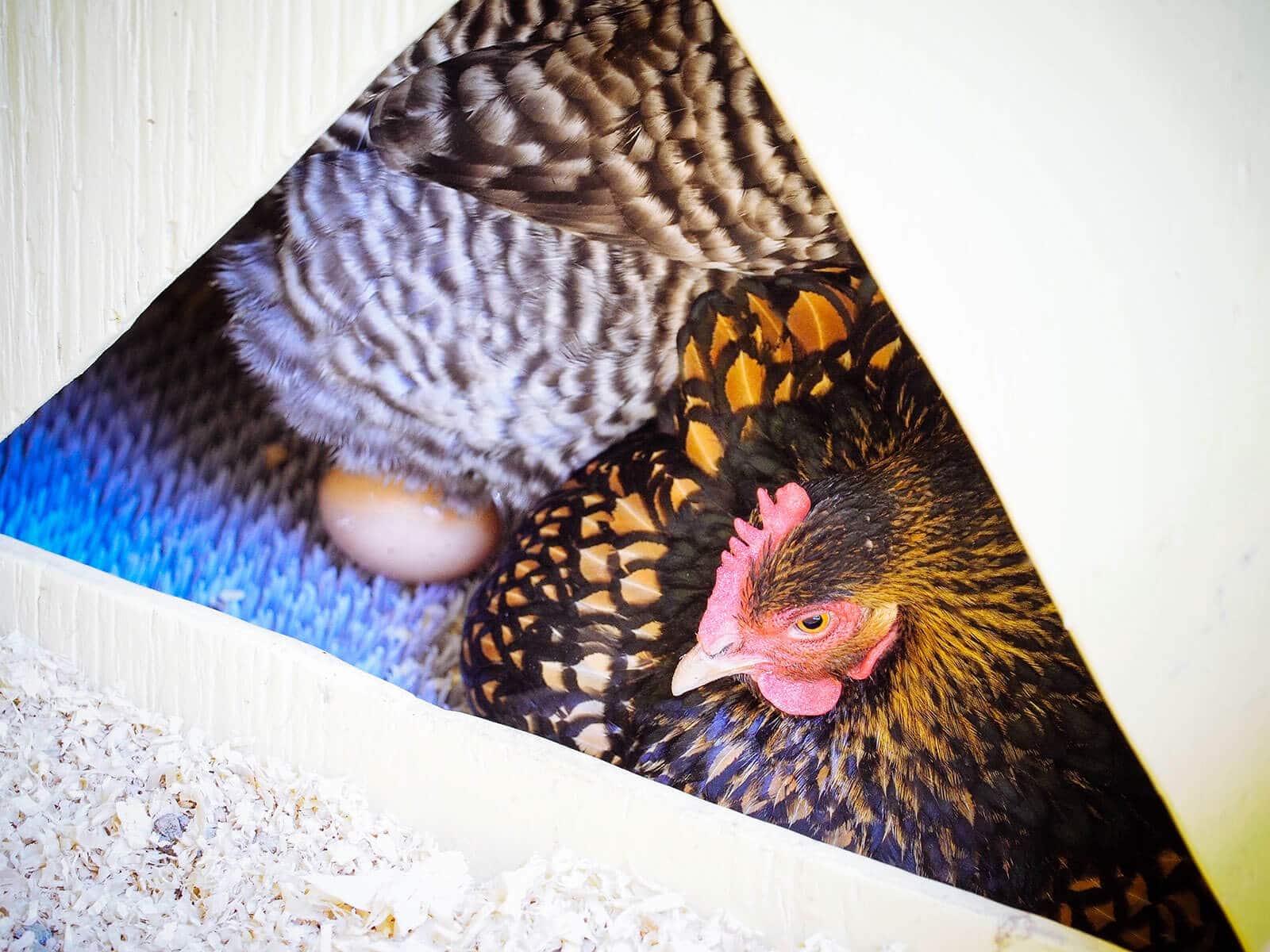
5 easy ways to break a broody hen
Method #1: Remove your broody hen from the nest. Repeatedly.
The easiest one to try first is to gently pry your chicken from her nest and put her outside with the rest of her flock.
She’ll ruffle her feathers, spread her wings, keep her body low, grumble at you, even peck at you — anything to protect her nest from the perceived threat against her real or imaginary eggs.
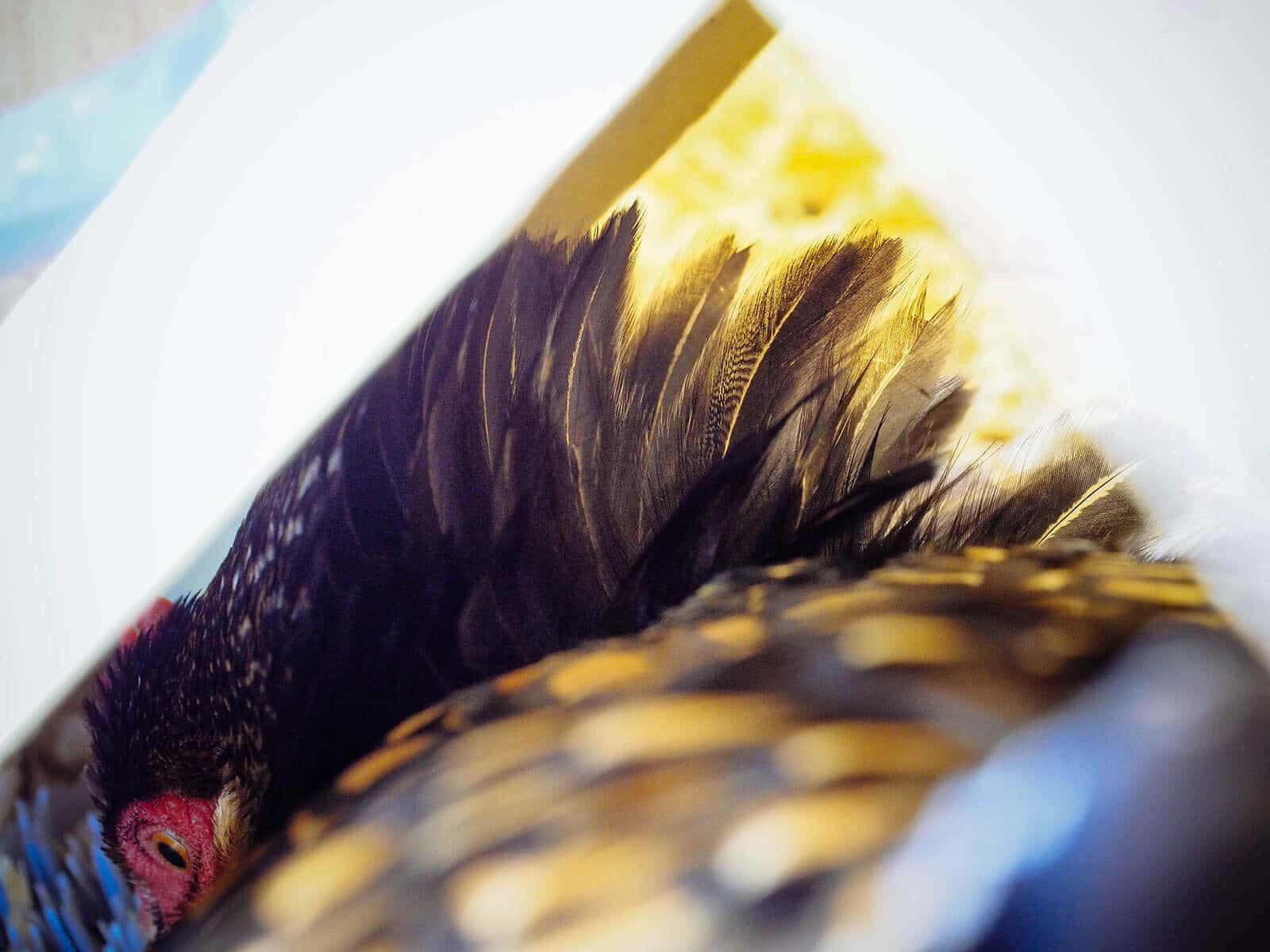
If there are eggs in the nest, collect them right away so she can’t continue sitting on them. Try to collect every egg as soon as it’s laid to remove any temptation for the broody to sit.
I like to carry my chicken around for 10 or 15 minutes while I make my rounds in the garden to “air her out,” so to speak. I throw out some treats, set her down on the ground, and encourage her to scratch and peck in the yard.
I add a few logs, branches, or upside-down buckets as interesting new places to roost, put a head of cabbage out for entertainment, or just dump a bowl of kitchen scraps for the flock to fling about. (I keep a large bowl in the kitchen as my countertop compost, and empty it every day in the chicken run.)
A disgruntled chicken may hop back into the egg box once you put her down, so if she does, simply remove her from the nest and carry her around again. You want to distract her as much as possible with “shiny new objects,” so to speak.
Method #2: Give your broody hen a distraction.
Speaking of shiny new objects, I’ve found that even the most stubborn broodies (like my Wyandotte this summer, who actually forced her way into the coop when we tried to block it) will get off the nest if there are new flock members around.
I recently started to integrate our new chickens with the existing flock and as soon as the pullets were let out of their temporary coop, my broody Wyandotte hopped off her nest to see what the fuss was about. She then spent the rest of the day (and following days) trying to establish pecking order.
So, if you happen to be introducing new chickens, early to mid summer (when most chickens go broody) is an ideal time to do it.
Method #3: Give your broody hen a (gentle!) cold water bath.
If your broody lady is still determined to nest, try my next trick: the cold water bath.
Fill a sink or wash tub with a few inches of cold water and gently lower the chicken into the bath. (Please use common sense if you live someplace with freezing cold tap water, like I do in Oregon, and turn the faucet to refreshingly cool water instead.)
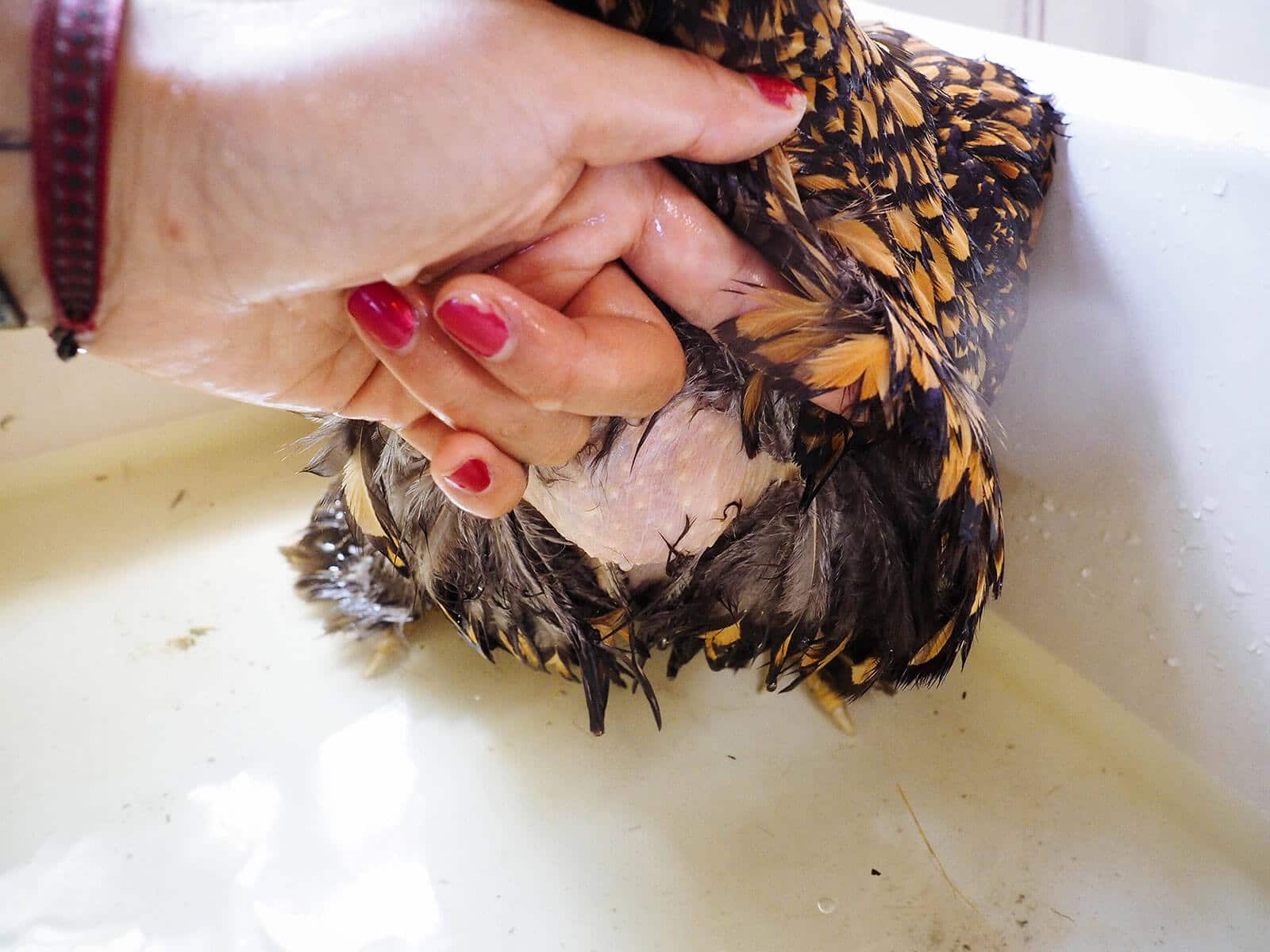
You only need enough water to cover her chest when she sits. (Poor thing, she’s totally bare there!)
The theory here is that you’re helping cool down her chest and her vent, thereby lowering her broody body temperature.
Just as I do when I give a chicken spa bath, I place a towel over my chicken’s head to keep her calm and leave her in the cold (or cool) water for a few minutes.
During this time, I’ll clean her vent and pull off any dried poop stuck to her feathers; there’s usually quite a bit of it, as she’s not pooping regularly.
Then she’s quickly toweled off but not blow-dried, as I want her to walk around the yard, occupying herself with preening and air drying her feathers.
Please, only give your chicken a cold water bath when it’s warm and sunny outside!
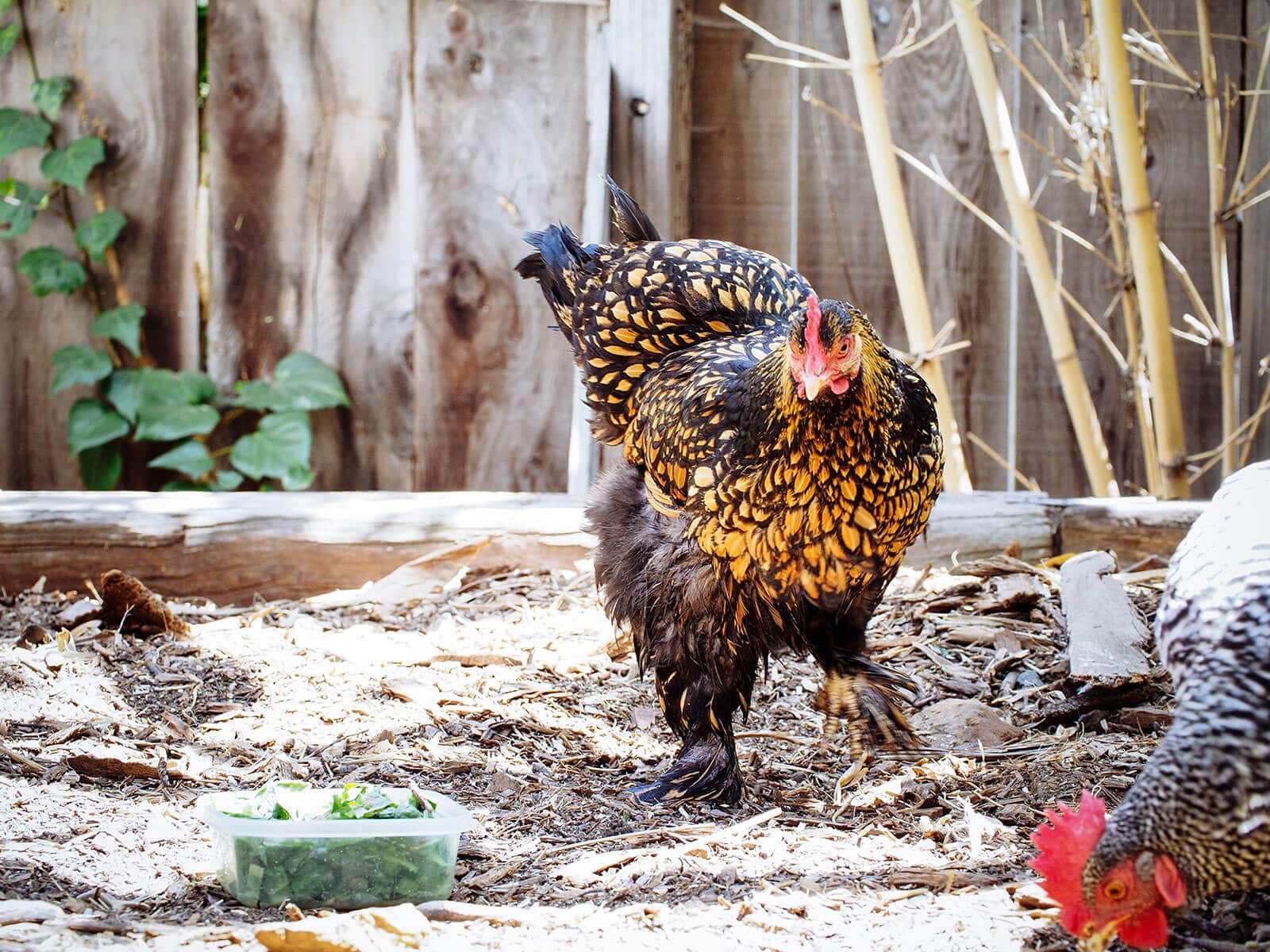
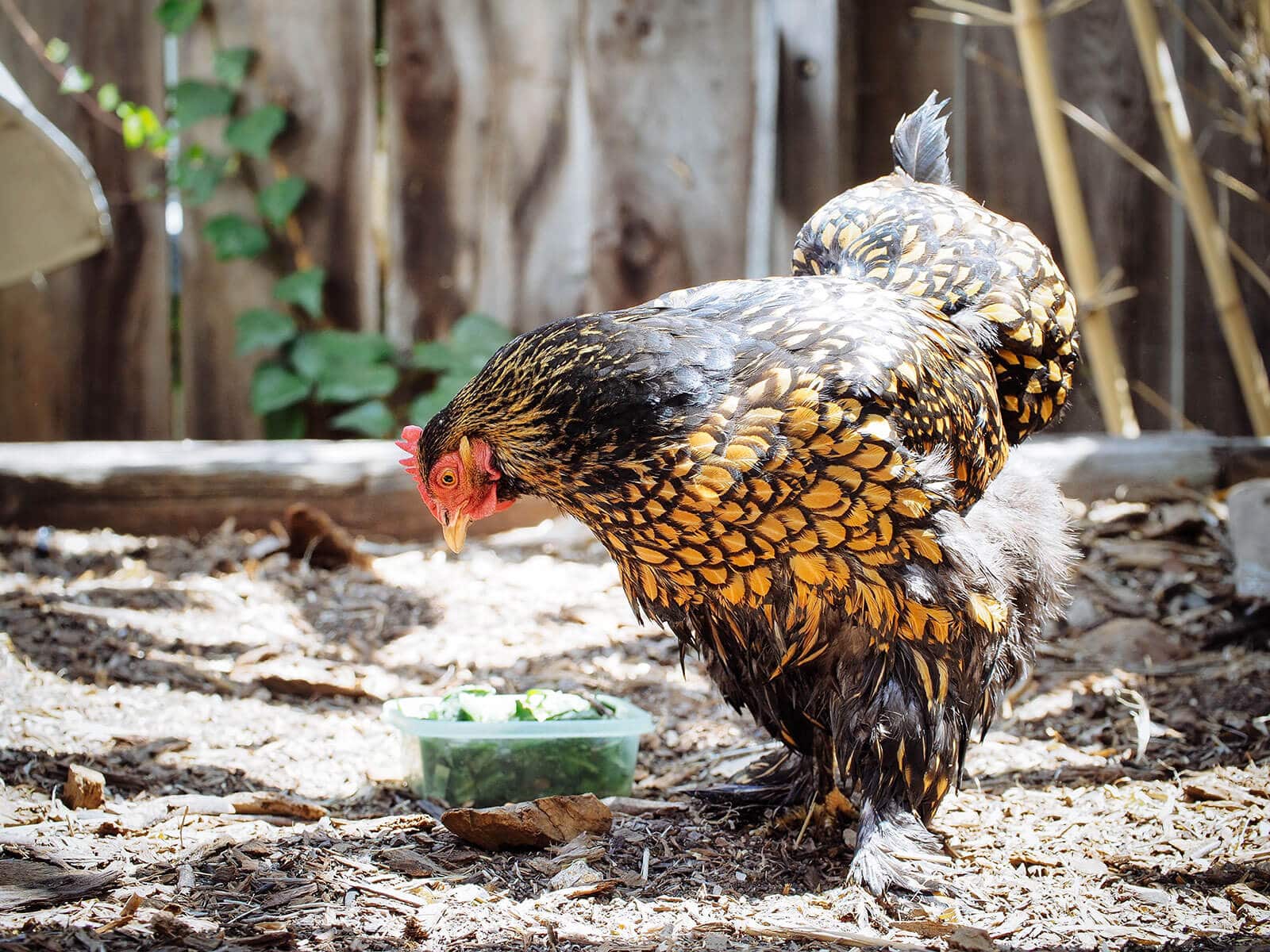
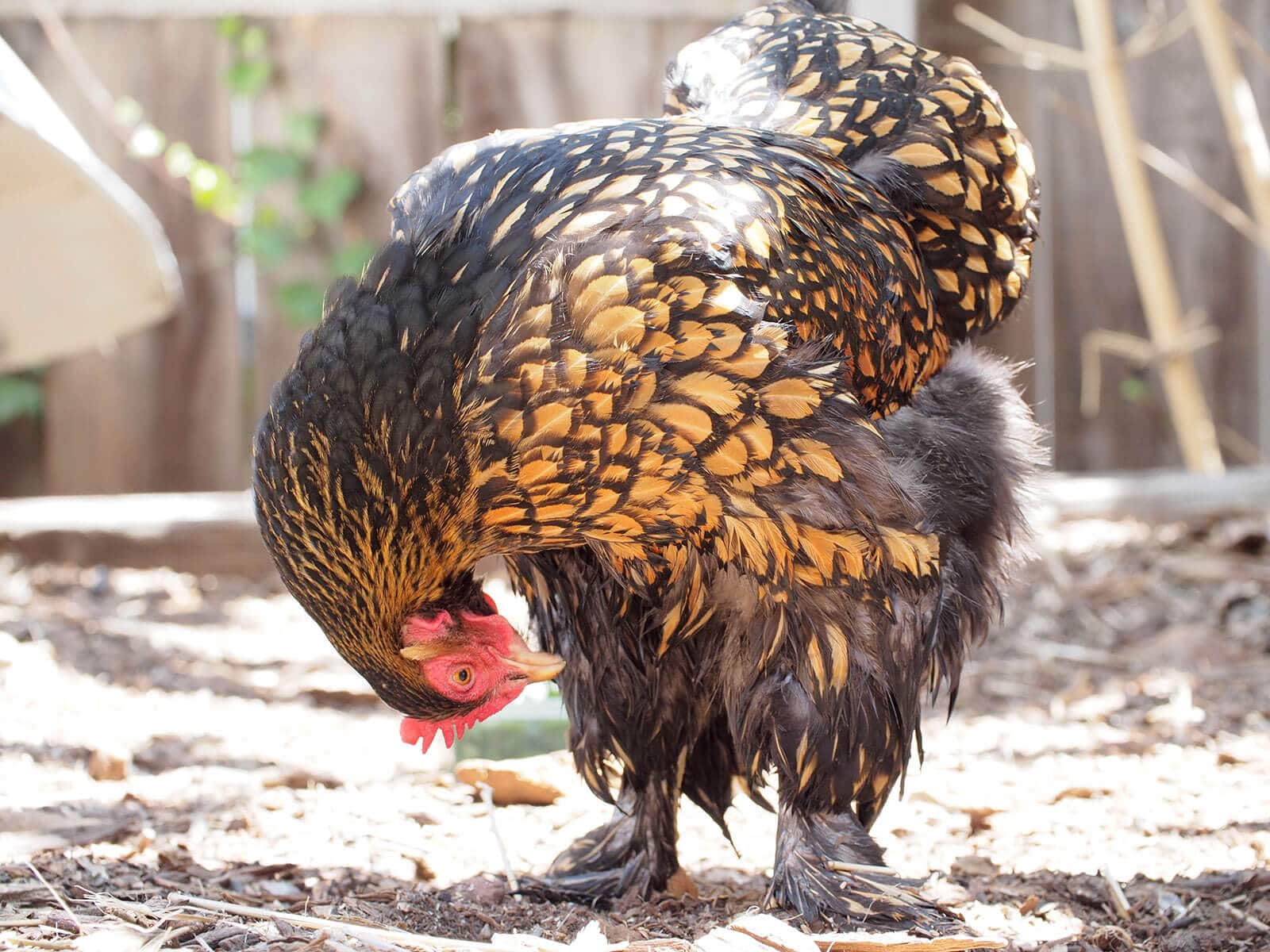
Method #4: Lock your broody hen out of the coop.
For good measure after doing Methods #1 or #2 above, I also lock my broody out of the coop; I do this when I know my other chickens have already laid an egg for the day.
Miss Broody will usually pace outside the door, crying, demanding to be let back in to nest. Or, she’ll find herself a comfortable makeshift nest on the grass, in the mulch, or in a shallow pit of dirt, and sit there for the rest of the day, ignoring her flockmates.
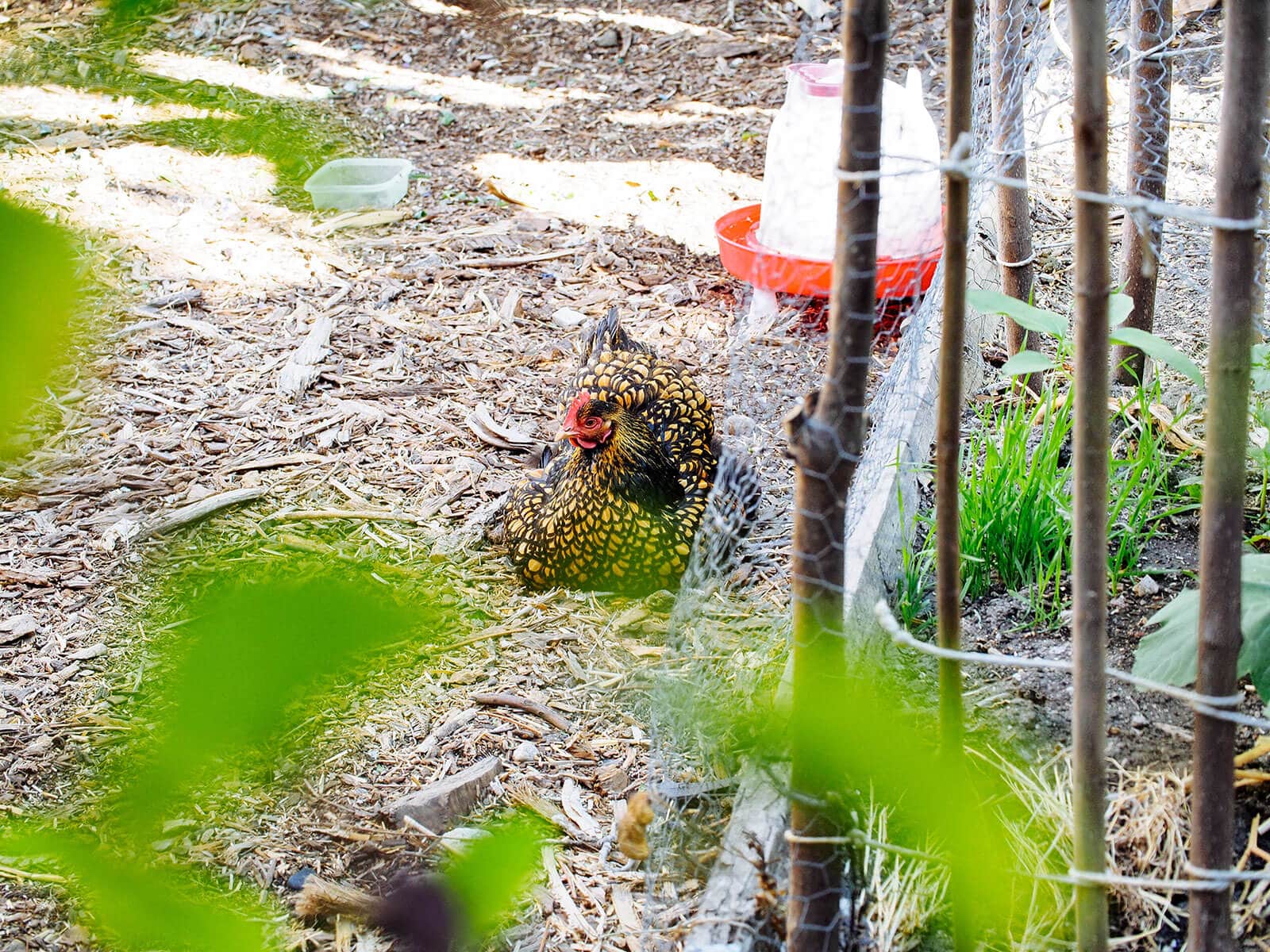
Whenever possible, I’ll lure her with treats from the garden so she has to get up and move about.
Before sunset, I unlock the coop so the flock can tuck themselves in for the night. The broody hen may make a beeline for the egg box. If this happens, transfer her onto the roost. By that time, it’ll usually be dark enough that she won’t be able to make her way back to the box.
The next morning, you might find her wandering around with her flock… or you might find her nesting again.
Repeat the cold water bath, lock her out of the coop, and manually place her on the roost again that night.
If your chicken runs out to greet you in the morning and goes about her daily scratching and pecking, she might be back to her normal self. But keep an eye on her throughout the day, as I actually did find my chicken back in the egg box that afternoon.
Method #5: Chicken jail.
Do you know what happens to a naughty chicken that stays broody?
Yup. Chicken jail.
Or as I like to call it, Casa de Gallinas (the farm version of casa de perros, which I’m sure every spouse has found himself in at some point).
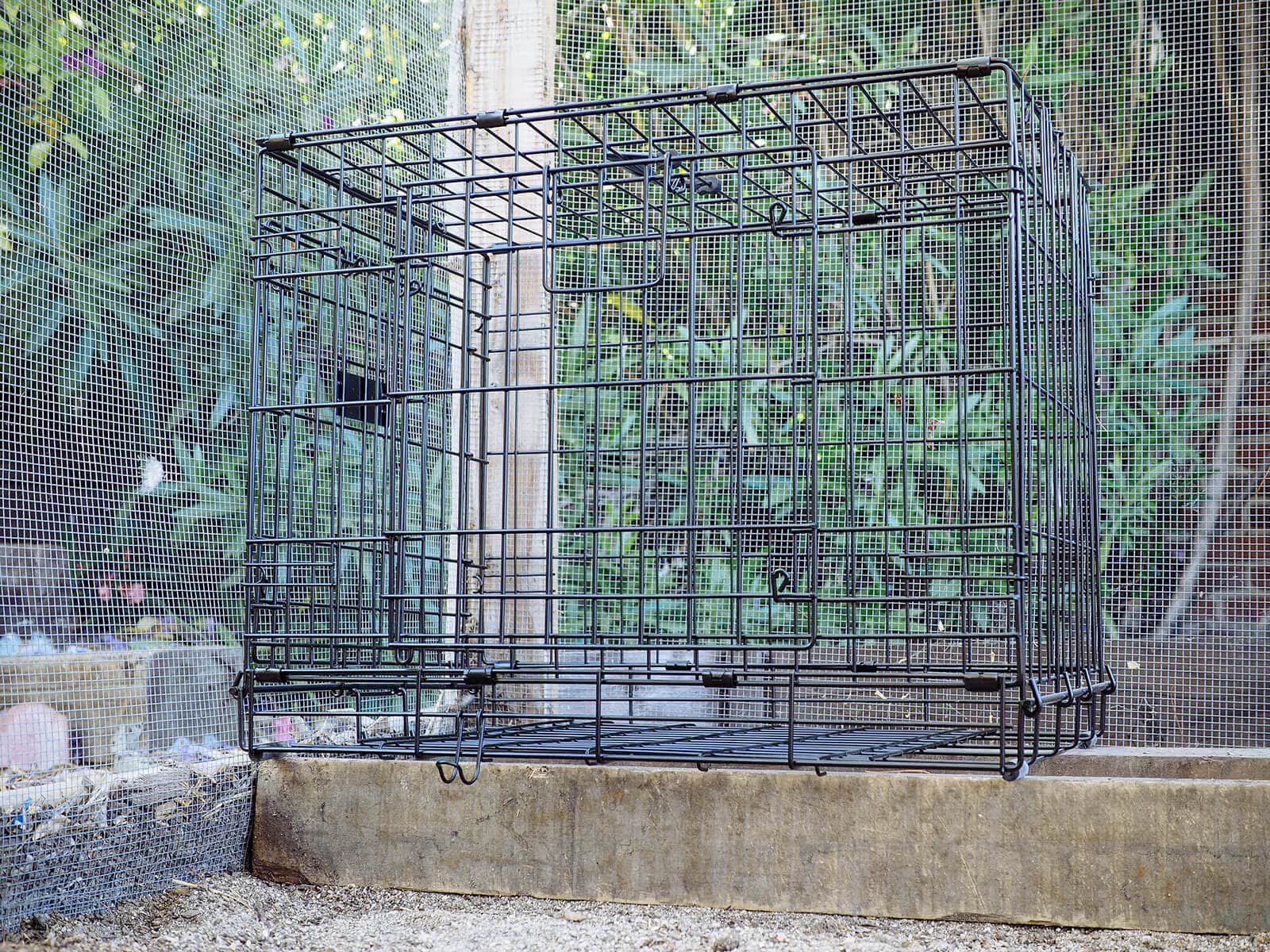
A chicken jail can be a wire dog kennel, a rabbit hutch, or an enclosed pen (which some flock owners keep as “hospital pens” for quarantining sick hens or isolation pens for introducing new flock members).
In my case, I used a medium-sized dog kennel. It came with a separate wire panel that could be attached inside to divide the space for puppy training. It also had a plastic mat underfoot, which I removed.
The goal of chicken jail is to make your broody as bored and uncomfortable as possible—no nesting areas, no warm dark cozy corner to hide in.
Ideally, the kennel should be elevated on wooden beams, cinder blocks, small crates, or anything that’s safe and stable and will provide plenty of air flow under and around the chicken as she sits.
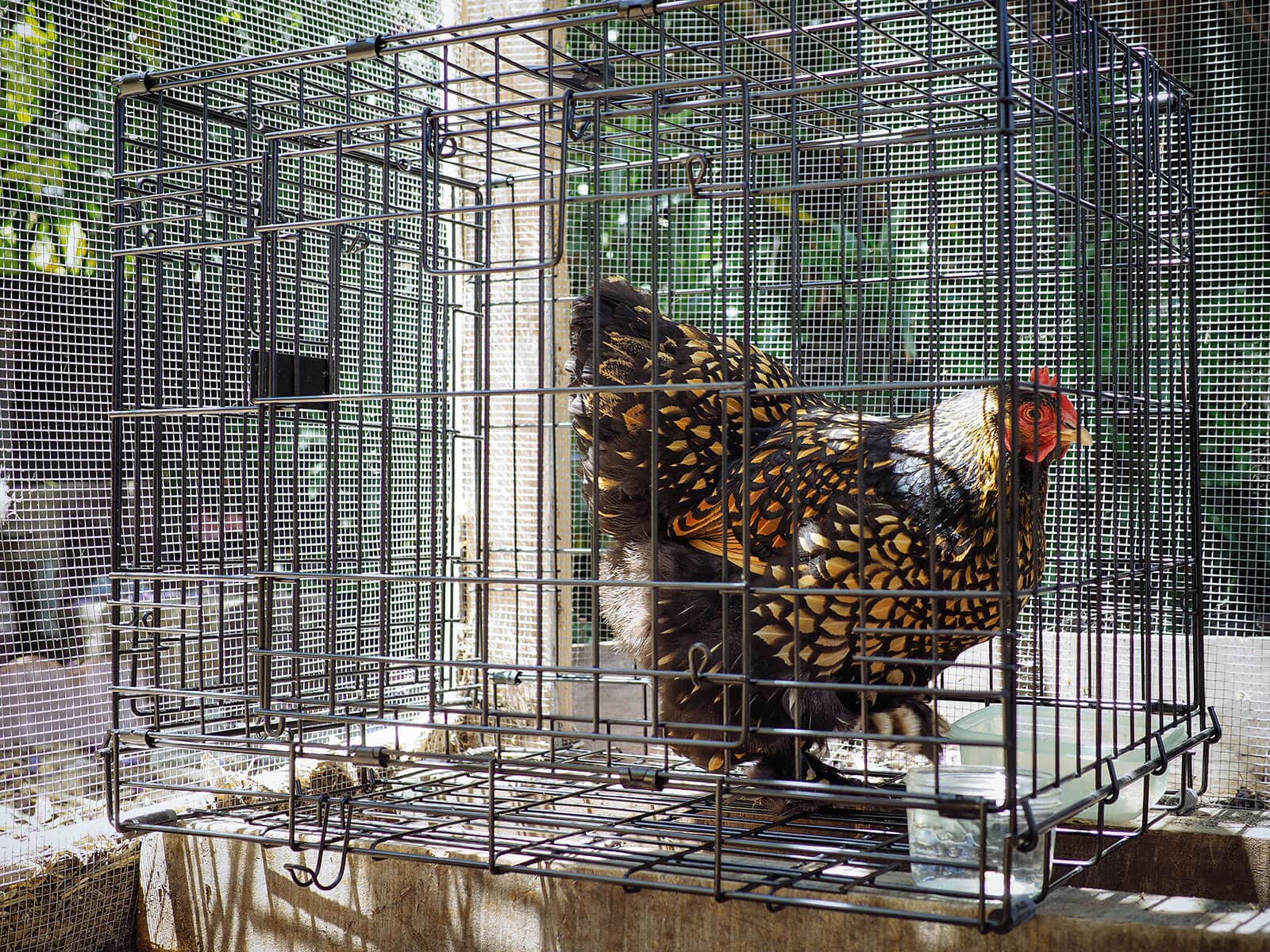
In place of the plastic mat, I laid down the wire panel, which had a smaller grid and offered a little more foot grip. You want your chicken to be uncomfortable, but you don’t want her to hurt herself. A sheet of hardware cloth also works well for flooring.
Place your chicken inside the kennel with plenty of food and water, and leave her in there all day and all night. She does not roost with the rest of the flock, nor does she get her own roost.
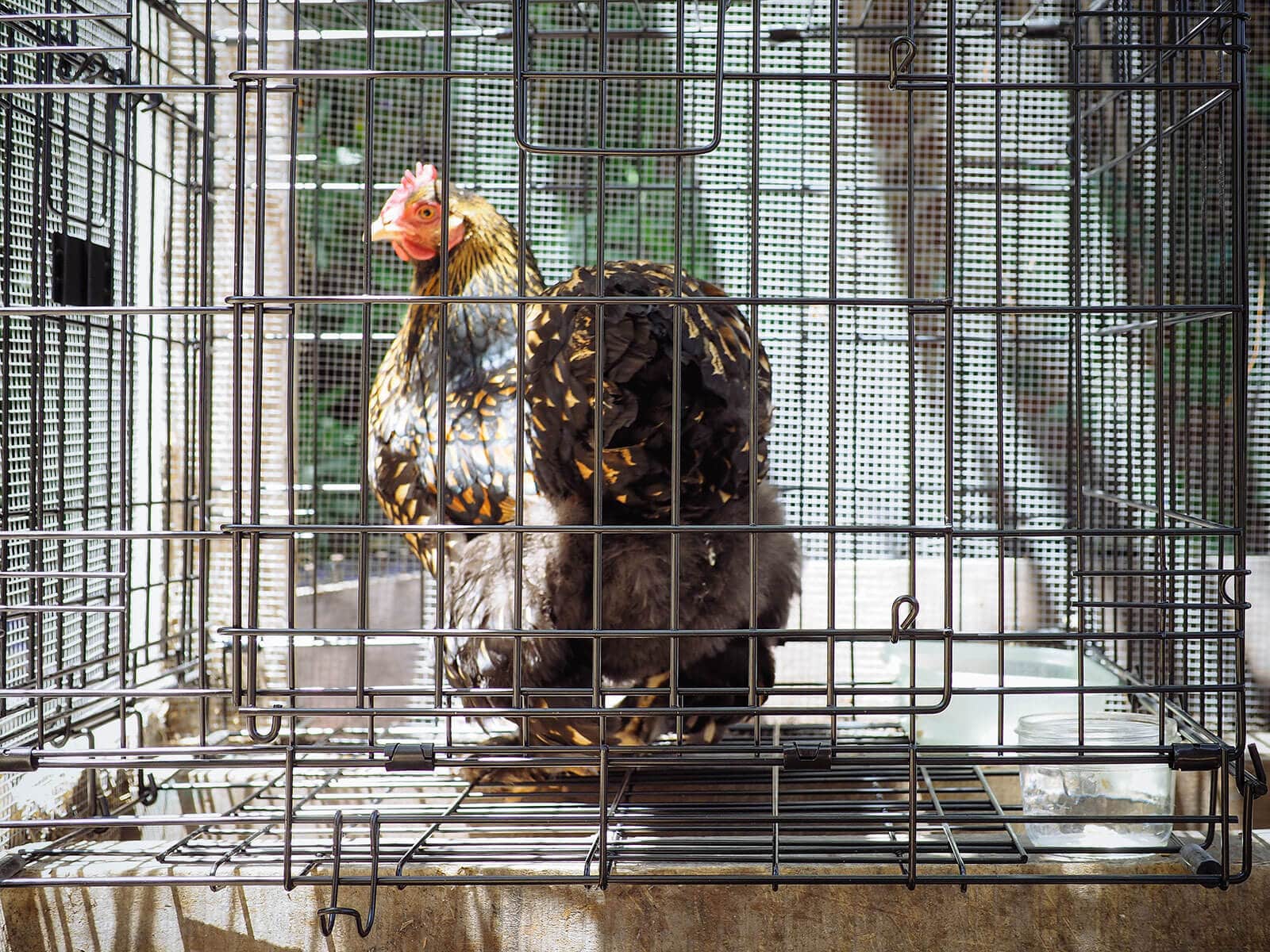
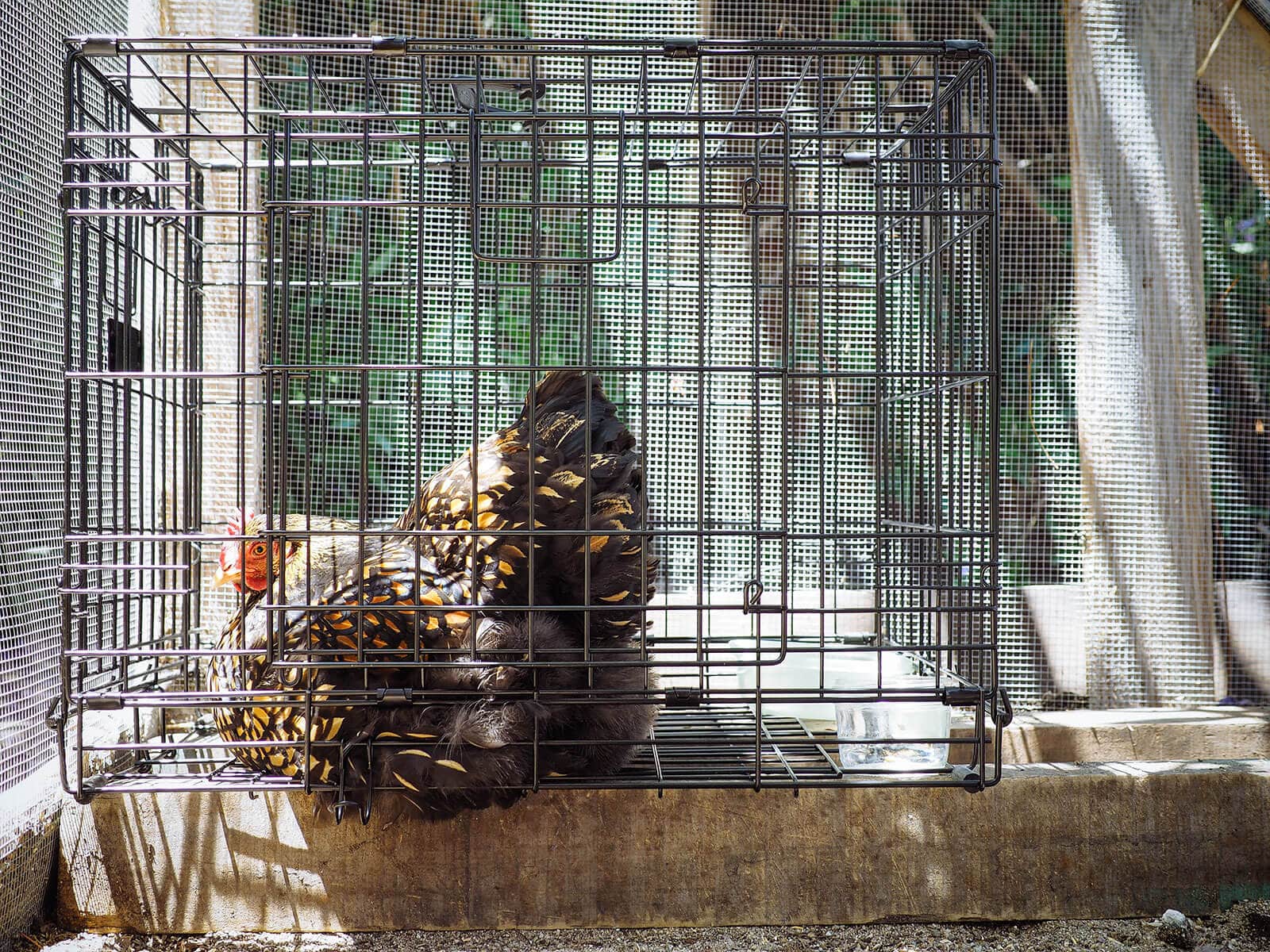
I put the kennel inside our enclosed run, as it gets good dappled light and a soft cool breeze throughout the day (mitigating her desire to nest). It offers protection from predators but still feels social, as my other chickens like to hang around it.
In the morning, let your broody out and observe her behavior. If she runs immediately to the egg box, back into chicken jail she goes. If she starts scratching the ground and interacting with the other chickens, success!
Do keep an eye on her and make sure she doesn’t retreat to her nest again. It took my chicken two-and-a-half days of chicken jail before I was able to break her broodiness. (I’ve read that some particularly stubborn chickens may spend up to six days in confinement before they’re back to their normal selves.)
When I let my chicken out on that third morning, she happily bounded out of the kennel and started dust bathing in the mulch. She ate out of my hand again and ran after every mealworm I threw out.
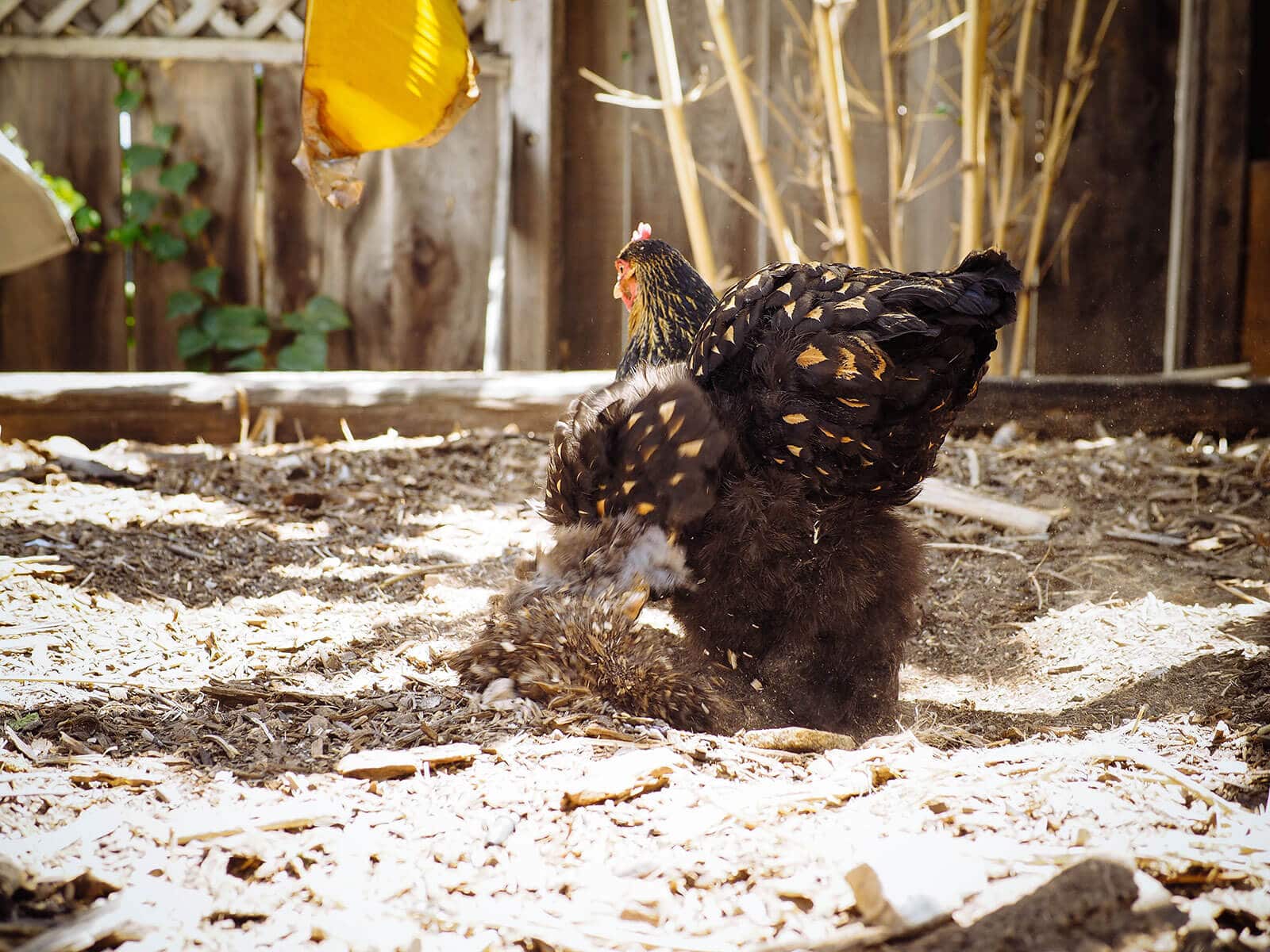
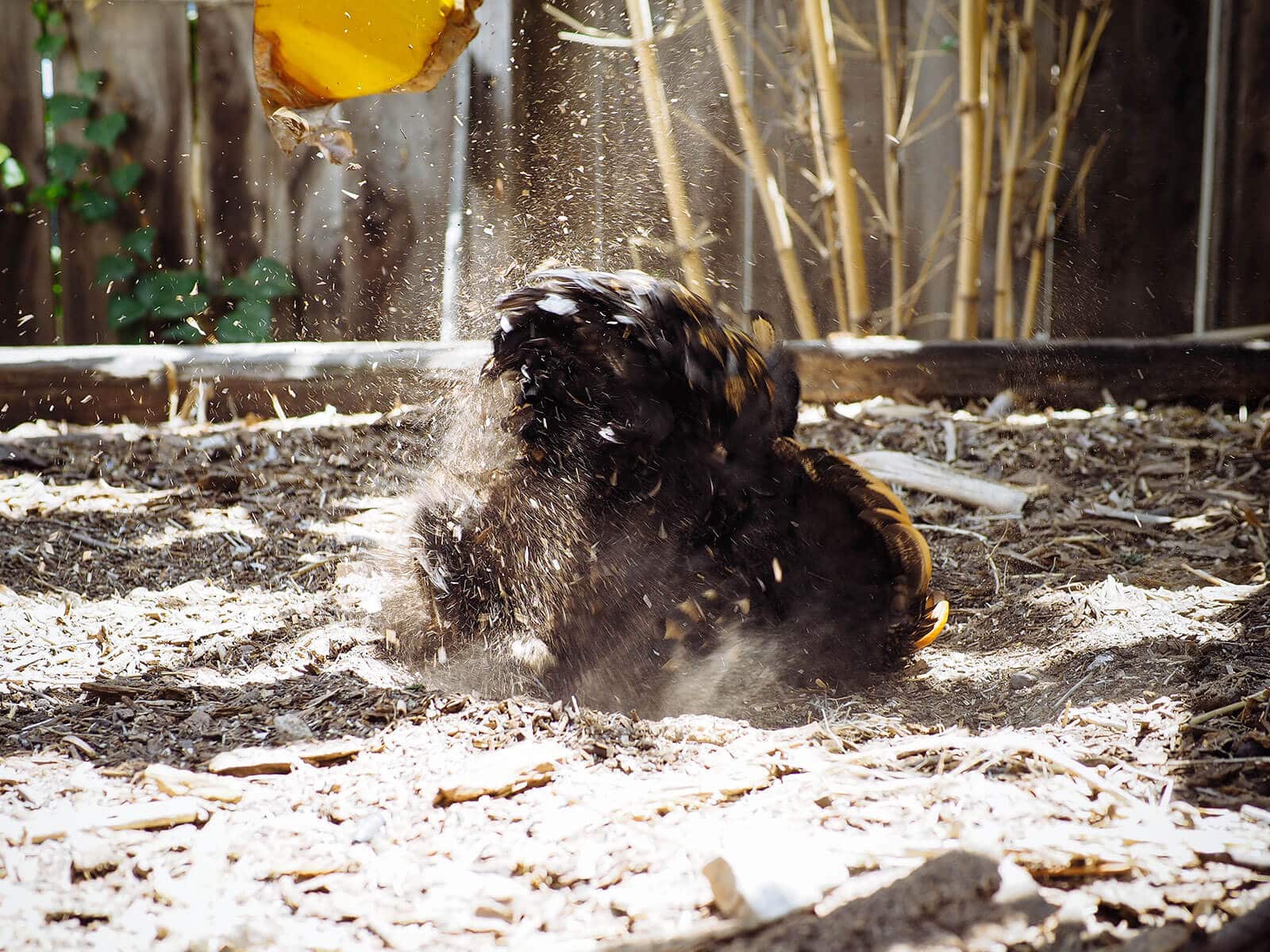
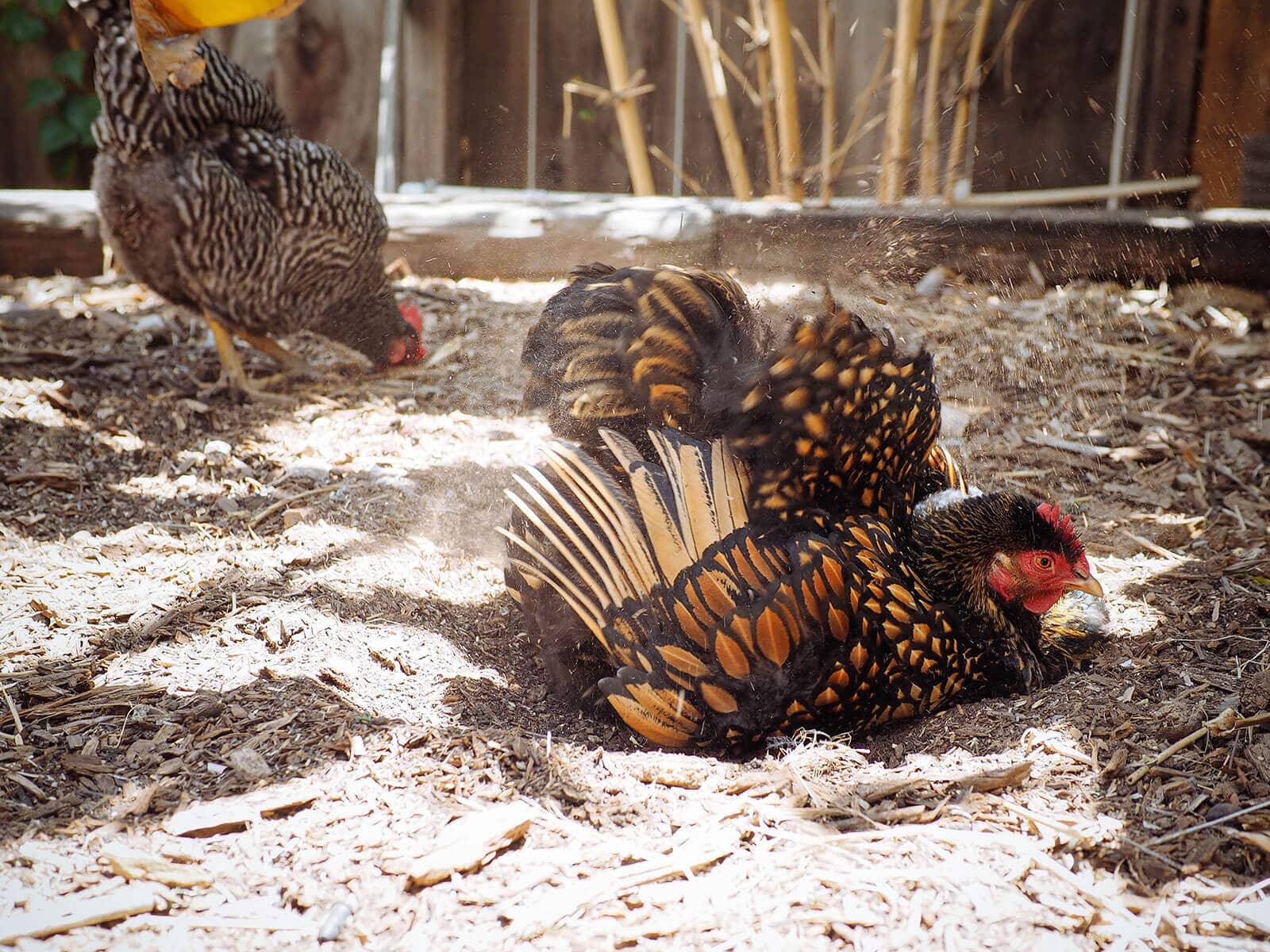
She also started following her flock sisters around, which was when I knew she was “cured”—the flock’s super social, so it was a relief to see them scratching and flapping around together.
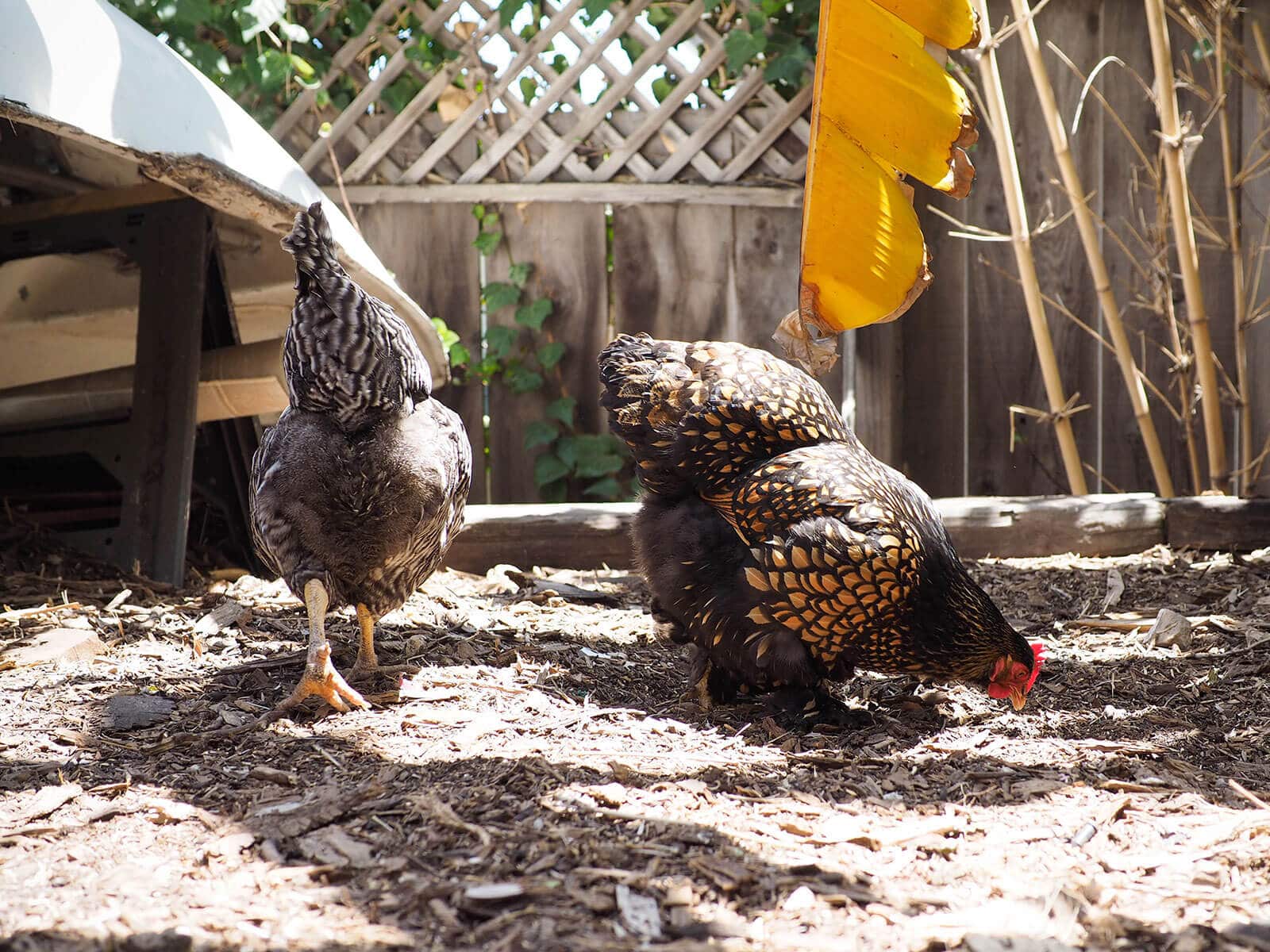
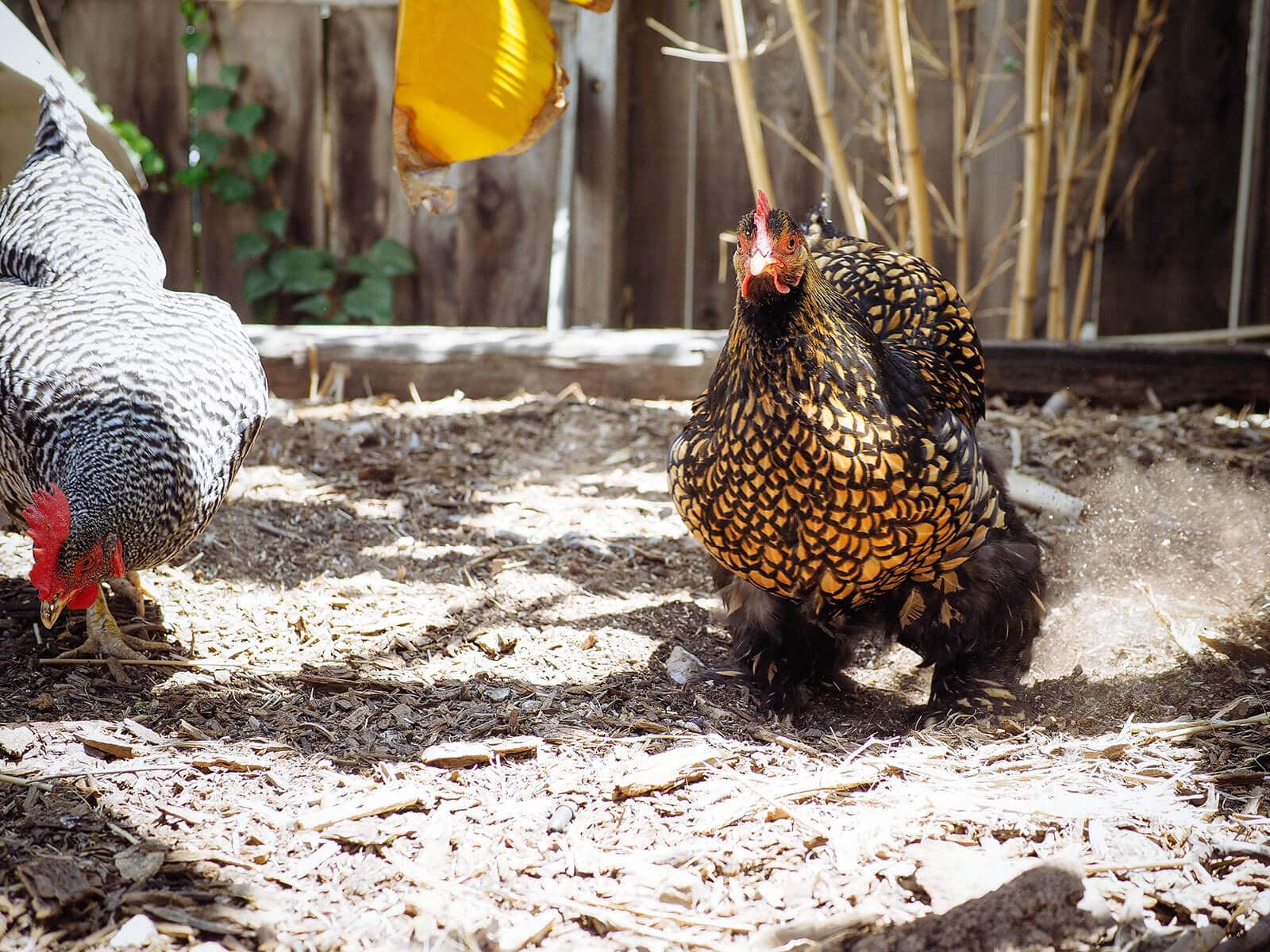
Since it takes some time for their hormone levels to get back in balance, ex-broodies may not lay for a couple of weeks after they’ve been broken. Just make sure they continue to eat, drink, and socialize, and watch for that first egg to pop out!
This post updated from an article that originally appeared on June 12, 2014.
View the Web Story on how to stop a broody hen.


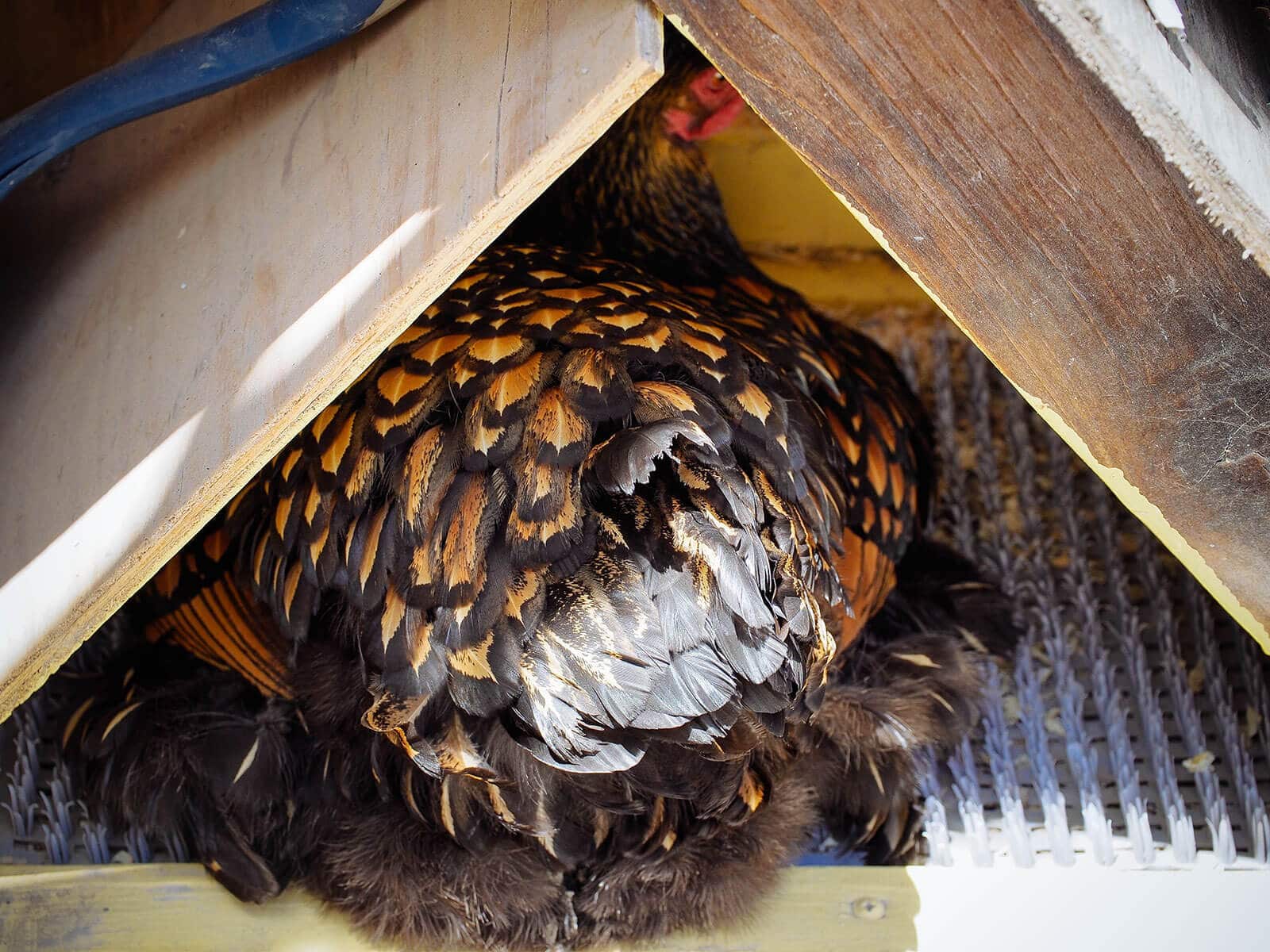

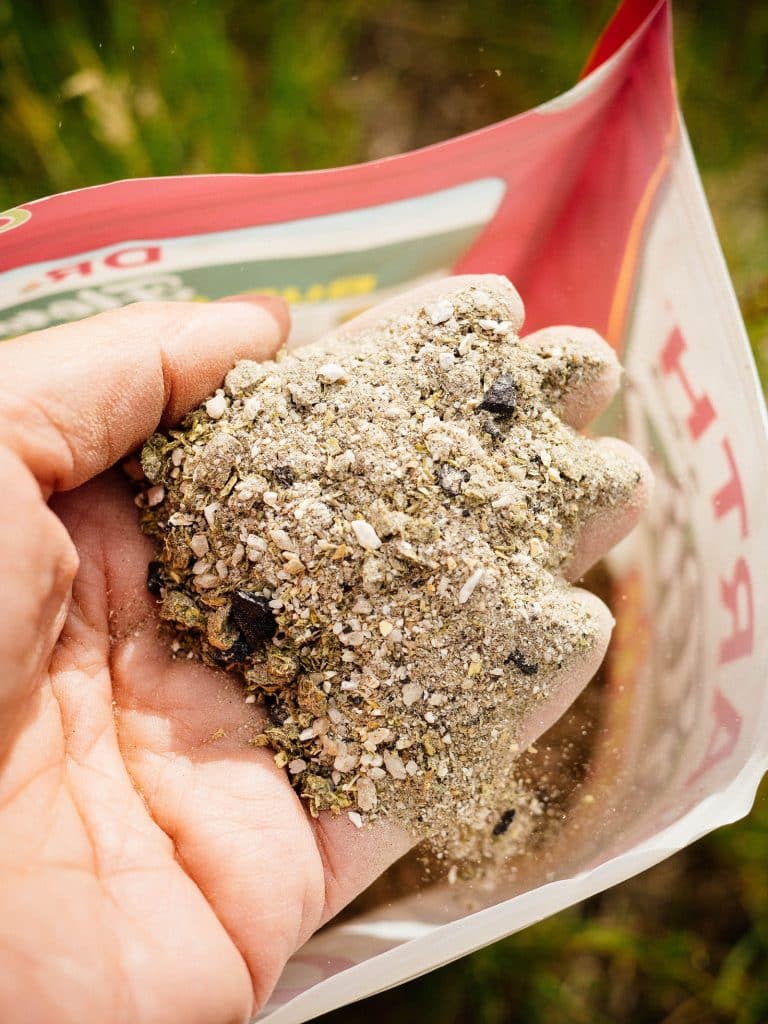







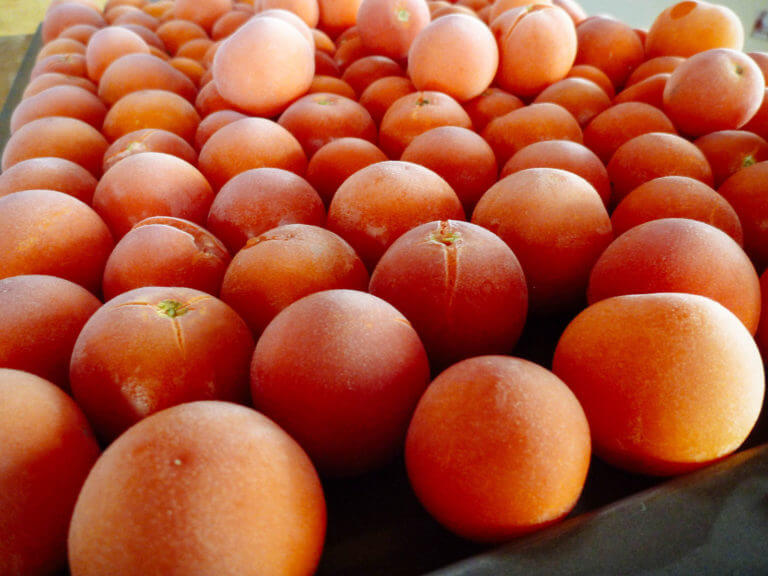
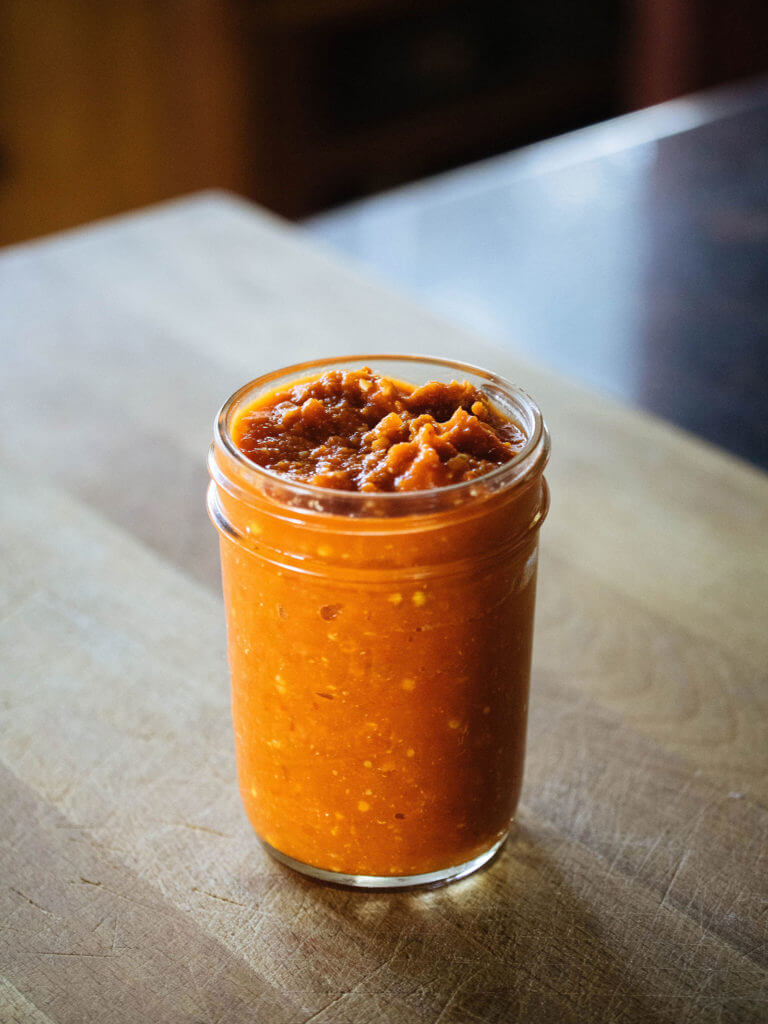
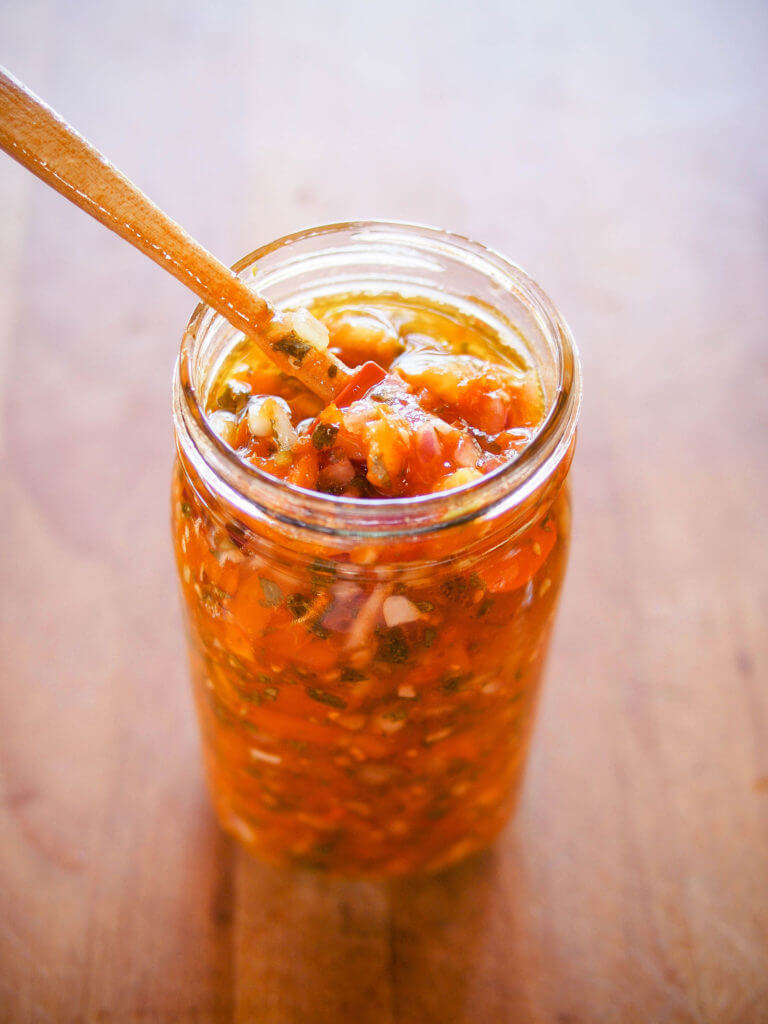

Tried these and the jail method was the only one to work. I did 2 days the first time and 3 days the second. In rural France (where I live now) I was told to put the broody hen in a sack and shake it for 2 minutes, and then ensure no access back to the nest. Sounded too harsh to me but I am told it works!
What a lovely blog. I currently have 2 broodies in Broody jail. One hasn’t given up despite all we’ve done over the last 2 weeks. She’s now caged on cold tiles in the rain. There is some shelter but she and her broody mate have chosen to move out of it. 2nd broody is a more recent broody and more aggresively determined to stay nested. I think the first will be ready for release tomorrow but the 2nd one may need a couple more days.
Each year we go away in May. Each year they get broody at this time. I have to write instuctions for our housesitters as last year was a disaster. We came home to 4 broodies, all very happy and sitting on 10’s of eggs (all of which I had to quickly destroy).
Thanks again for the blog. Beautiful photography.
Only one of all the chickens I’ve had was broody. But boy was she broody!! At least five times a year, sometimes more. I had tried all of the methods in your article but she just wanted to do what she wanted to do. You’ll never guess what kind she was. She’s on many a list of non-broody chickens. She was a Polish Crested! The absolute sweetest little girl. But very confused. LOL!! We don’t have a rooster, there are only two chickens here at any given time, and she used to even steal the other one’s eggs to sit on them! Poor sweet Sophie, she wanted baby chicks so badly! RIP Sophie. I hope you have your little family to love on now.
I have a broody free range hen who sat on a fake egg for 23 days after the loss of a recently hatched chick. Removed the egg and she want back amd sat. Have now covered the nesting spot. Hopefully her hormones will re-set and she will be back to giving us our daily eggs. How do I know when I can uncover her laying spot? It could not be more convenient, 6 feet from the front door!
Thank you, this all sounds very logical. I’ll give it a go. By the way the chicken in your photos looks exactly like my poor little girl who is still broody after none of her eggs hatched.
I have 2 broody hens. One I’m not worried about (she gives up about halfway) but my OTHER hen–my god. I’ve been taking her eggs and removing her from the nest and even spraying her close to FOUR MONTHS now. She will not give up! She’s a mixed bred small black hen. I hope the jail option works because she keeps hogging the nests, switching between them and ruining any eggs if I’m slow to collect them–which is almost always since I have a todler and a 3 month old to look after.
I took my broody bantam off the nest and into the chicken run to try to stop her from being broody. As soon as I did, the others started attacking her. Is this normal behavior? It sent her right back into the nest.
Hi Becky, just wondering if you got any replies to your message about your broody bantam being attacked by the others. I’ve got a situation like this right now and not sure if the behaviour is normal and what I should do, if anything, to stop it. I lift my broody silkie out of the nesting box so it can eat, drink and have a stretch but, as soon as I do, one of the other hens comes over and pecks her on the head. If you have any tips I would love to hear from you. thanks.
I have the same thing going on right now. She comes out to eat and drink and goes back because she is being bullied!
Kind of related question, I have a broody hen and have noticed she is beening very mean to the two other girls, when she comes outside. She is not #1 one hen as far as I can tell. I feel like the other two have become more afraid of me also. Running or moving away from me, which is not normal for them. Do you have any advice? Thanks
Thank you for the tips! For the jail, what do you do if it is not warm at night (20s-30s) is it ok to leave them out all night? Will it work to just do during the day? For today I have just locked the coop and they are in the run.
I’d like to know as well
I would bring them into your house in a bathroom or somewhere with a floor you can easily clean. I have a chicken rescue and am just now dealing with my first broody hen! It’s quite confounding to see. And manage. She runs out and was bossing the other hen in her little flock around!
Also, I feel so bad for her because she is wanting to be a Momma. She doesn’t realize they’re not gonna hatch because we do not have a rooster. Hope she gets happy again. Any advice for her to be happy and her old self?
Hi…I have 2 questions, 1 of which is definitely unrelated & the other is kind of unrelated to this topic!…We are very new to chickens, having just a couple of months or so ago bought 3 Plymouth Barred Rock chooks (something I have wanted to do for 20+ years!) First of all 1 was broody (thanks guys!), so we bought 3 duck (Muscovy ducks) eggs for her to sit on…2 hatched & are now HUGE!! (v sadly the 3rd got stuck) & she is such a wonderful mum…
Now the other 2 have gone broody (1st the 2nd, then the 3rd!), however that is not 1 of the questions because thank you, you have answered my 3rd question wonderfully well…! However…
Q1. One of the chooks I think is older than the other 2 (I think the 2 are 1 yr layers & the other is a 2 year layer) & she seems to have taken a huge dislike to 1 of the younger chooks (the one that has hatched 2 ducklings)…thank goodness the ‘mother’ is separated atm, as the older chook will just not let the younger one (only that hen) feed or drink, keeping a beady eye on what the younger one is doing & muscling in, pushing (literally) her out of the way, even pecking her…I’ve told the older one, repeatedly, that if she persists a. she’ll be for the pot(!) but mostly b. if she persists in her behaviours she won’t get anything to eat or drink herself because she’s too busy keeping an eye on what the younger hen is up to!! Q…Do we just put up with this & hope it sorts itself out? or do we give the older chook away?
Q2. When & how do we separate the ducklings from their mama hen? or do we just leave them to naturally separate?
Many thank you’s, in advance….i would be SO grateful if you could answer my Q’s…Ione
Chickens have a pecking order, determined by their personalities, age, how long they’ve been in residence, etc. There will always be a “boss” chicken and she will make sure she’s first at everything . (If you had a rooster, then he would be #1) All other chickens will have to fall in line until it’s their turn. The chicken who is getting picked on should eventually learn her place. As for the Muscovies (I have chickens and Muscovies myself), I don’t think there is any need to take them away from their “momma”. They will eventually do what Muscovies do by instinct, but they will always remain friends with their momma and likely the whole chicken flock. Hope this helps.
Yaa, also mine does so
Good expressions
Hi, I have (amongst others) 2 young Araucanas. They are around 6 months old. Both are great layers. They always lay in the same place – and then they sit on their egg for hours afterwards, getting quite aggressive if anyone approaches them. Does this mean they are getting broody? They are still laying every day. It’s just that they spend a very long time sitting on the egg afterwards. One of them was laying in a spot so well hidden I couldn’t find it, so I kept her contained until she started pacing and getting frantic. Then let her out and – sure enough – when I followed her I found a nest full to the brim of her eggs (easy to know they were all hers because they are blue). I have removed all the eggs now, at least I know where they are going forward.. The question is whether this behaviour means they are either broody or about to go broody?
Hello, I have a Buff Orpington (Patty) that went broody last month and is now doing it again this month. She so far hasn’t been hard to break. Locking her out of the coop during the day seems to do the trick, or it at least did last month. Today I had some time to sit outside with them today and I noticed that my non-broody australorp chased Patty out of her nest and sent her outside the coop. They have a run I let them out into during the day. Then the Australorp (Laverne) kept running back and forth to guard the nesting boxes. She’d come out and forage and then run back to the boxes, go into the nesting box that Patty had been holed up in, and come back out again and so far no one has laid eggs today. I’m new to chickens, can you help me understand this behavior? Thanks!
If you have a new flock (or recently changed or added to your flock), the hens may just be establishing or reestablishing their pecking order right now, and it sounds like Laverne is vying for the spot of Alpha Hen.
Also, it’s not uncommon for chickens to lay in places other than their nesting boxes, especially if one of them had gone broody, or if an alpha prevented other chickens from laying in the boxes. Personally I would search the coop and run for potential secret nests, especially if it’s been a couple of days since you’ve gotten eggs in the nest boxes.
We want to try chicken jail, but it’s wintertime and freezing out at night! What can we do with our broody hen at night when it’s so cold?
I would try chicken jail during the day only, let her roost at night, then move her back in jail in the morning.
Make your chicken jail in a cool room of the house?
Your broody hen advice is so welcome as we have been a bit stumped. 6 of our 12 bantam hens ,
(a mixed lot of Plymouth bars, silkies, frizzled cochin and fleur d’ucles) have become broody. Chicken jail sounds fine but how do I “jail” six? I have just locked out all hens during the daytime hours to keep them out of the nest boxes. Yes, there are still 2 laying so I guess they will find another spot in the chicken run to lay their eggs. I am not around all day to monitor when the two lay their eggs to then lock out all the rest. A logistical puzzle for those of us not home a lot during the day. Help! Thank you. haroldg49
Aside from locking them out of the coop, you can try jailing them in multiple dog kennels, or perhaps a separate “recovery coop” (if you have one), rabbit cage, or other airy enclosure that does not allow them to nest and get too cozy.
is there a way to get the feathers on her chest to grow back?
All the feathers will grow back over time. Just continue to give your chickens a well-balanced diet with the proper amount of protein.
I followed your instruction and they worked perfectly!!
Thank you so much.
Yay! Happy to help!
Can I start with chicken jail from the beginning. I think she’s only been nesting or being Brody for 3 or 4. Two of them are doing and the same breed. They are 8 or 9 months old.
I meant to say 3 or 4 days.
Yes, you can start with chicken jail. These days I do just that, since I know I can’t break my hen (the only one who turns broody around the same time every year) with the other methods.
My skyline has just hopefully completed her broody rehab successfully!
After two days of just purely removing her from the nesting box to no avail it was straight to jail! 24 hours later she emerged a different girl and touch wood isn’t showing any broody signs at all – except for not laying, which she has the upper hand on!
I’m glad it worked out! They can be so stubborn sometimes, huh? 😉
After months of having three of my eight layers being broody most of the time and only getting 2-6 eggs a day, I am starting my chicken jail program. I am using an animal trap up on blocks as my jail. The hen will have plenty of room to move around and get plenty of air circulation.Wish me luck!
Thanks for the info, even though I have 3 boxes for my 2 chickens, they want to lay in the same one. This is preventing my other chicken from laying which = no eggs at all for me! When I tried to move the broody one she was pissed. When I moved her, there was no eggs! I can’t wait to try your method, I miss my yummy eggs!
Good luck with your broody!
One of my Banty chickens never leaves her nesting box and has lost all of her feathers on her wings. Her nest mate also lays with her in the same nesting box. She now has a pale come and white scaly legs. Any suggestions
If she’s broody, then following one of the solutions mentioned in this post should help. White scaly legs can also be a sign of scaly leg mites, in which case you need to treat your flock for parasites and disinfect the nest and coop before the infestation gets out of control.
My broody girls starting losing feathers on their wings too.. it was the depluming mite. Sulphur powder helps if you want to look that up 🙂
Hens normally lose color in comb, around eyes & feet when broody or during molting seasons. Color will return if they are getting adequate nutrition, enough sunlight & have no other underlying health problems.
We have 19 hens and 5 roosters but they only put eggs in two nest. Now one hen has taken about 15 eggs and others are still laying eggs in her nest. How many eggs can she hatch? They were all hatched May 11, 2015. She has white, green, brown and chocolate eggs so she has adopted all the eggs she can get. How do we get the other hens to use a different nest they have 4 nobody uses?
You can try moving the eggs to the empty nests, and leaving them there until the hens take notice and start laying in them.
We took away all the eggs because some hatched and they killed them. We got an incubator to put them in and they had over 4 dozen in the nest with three hens. Now three have hatched and we are putting them in a smaller hen house away from the grown fowl. What can we do with dozens of baby chicks? He won’t kill any to eat, they are pets but when you get to about 6 dozen pet chickens you would think some could be food.
That’s quite a handful of new hens! I hope you’re able to find them good homes if you don’t keep (or cull) them. 🙂
Hello! I have 2 8 month old hens of different breeds, one is unknown and the other is definitely an Orpington and the Orpington has stopped laying eggs completely this October. The other has continued laying. I caught the Orpington sleeping in the nesting box last night. She has continued to spend a lot of time in the nesting box but isn’t completely distraught when I move her and take the egg (laid by the other chicken). I’m not sure if she is truly broody or not….we live in northern New Mexico where it has froze a few nights here, nothing extreme, so maybe it’s just the season? Is it possible for a hen to be “sort of” broody, particulalry in the winter?
Chickens can and do get broody in winter, so definitely keep an eye on her.
Thank you Linda! I haven’t caught her in the nesting box again but she still isn’t laying. But I think she’s pulling feathers out of the other hen! 🙁 Just around her neck. It’s not super aggressive, just a little each night, it seems, because most of the feathers I find are in their roosting box. Is that an additional behavior of broody hens?
Yes, broody hens can become quite bitchy! LOL… mine turns into a little terror if the other (non-broody) hen tries to invade her space or eat “her” treats. Hormonal issues, I guess. This time of year, it’s also common for hens to stop or slow their laying because of the reduced daylight. They’ll usually pick up again in late winter or early spring.
Can you tell me why the should be no roost in chicken jail please
I would like to have a few chickens from spring til fall as winters are brutal sometimes and I’m not equipped enough to care for them and I can see myself bringing them inside; I know I know, not something ya do with chickens. The information is wonderful to know and share.
There are many people who raise chickens in harsh winter climates, but they take extra measures to ensure their flock stays safe and healthy. I recommend waiting until you’re ready, time- and equipment-wise, before getting your own. 🙂
If my chickens are stil laying every day but spending almost all day in the nesting box does this mean they are broody? Their behaviour is normal in the morning and late afternoon but spending 4-6 hours inside the nesting box. I’m a bit confused and not sure what to do. They have both only been laying for 1 and 2 weeks. Thanks.
Broody hens will generally stop laying once they’ve laid a clutch of eggs to sit on. Make sure you collect all of their eggs at least once or twice a day, and try to lure them out with treats if you find them spending too much time in the nest.
I LOVE to read your blog entries. Your blog is always so informative and fun to watch, it’s like a breath of fresh air on a writing form
Thank you for the kind comment! Made my Monday!!
NEVER give your broody hen a COLD WATER BATH. That is INHUMANE. You break broodies by using a wire dog crate and nothing more. It may take up to a week and you may need to repeat the process but you treat your chickens humanely at all times. COLD WATER BATHS are not humane.
I have to disagree, as I don’t feel cold water from the tap is an inhumane treatment. My broody settles right into her cold water bath without putting up a fuss. Now, if you were forcibly dunking your chicken, putting a wet chicken outside in cold weather, putting ice in the bath, or maybe even live in an area where your cold water comes from snowmelt, then I’d consider that cruel. As always, use your best judgment.
Totally disagree with you! Not inhumane at all!! Of course never in cold weather but most broodys go broddy in the warmer months anyway. Cool not cold water is all that’s needed and anyone who has chickens know they go out in the rain quite happily even in cold weather 🙂 in fact I think separating a chicken from her flock for days on end with nothing at all to do on an uncomfortable wire floor to be even more inhumane than a quick cool bath and back to her normal chicken life 🙂
Thank you for your detailed information re: broody hens. Just as I was reading your post, we were in the process of “curing” our Cuckoo Maran of this undesired behavior. It took about three days of total isolation in the dog crate to get her to “snap out” of it, but she seems to be back to her old self, just mingling and pecking with the other eleven hens!
I’m glad she’s back to her normal self!
If your hen continues to sit on unfertilized or imaginary eggs: How to Break a Broody Hen http://t.co/hKpsjxwYpY < TY for RT! @ExtravagantG
Gosh, mine has been broody for weeks. I keep popping her out but it’s hard as the others lay at all different times of the day. I’ve put her in jail for 4 days to no effect. Am at my wits end.
Every flock owner should know what to do when this happens: How to Break a Broody Hen http://t.co/PFHcURKa22 #backyardchickens
A broody hen allowed to sit on unfertilized/imaginary eggs could starve herself: How to Break a Broody Hen http://t.co/huZqLeVZhO #poultry
RT @theGardenBetty: If your chicken continues to sit on unfertilized or imaginary eggs: How to Break a Broody Hen http://t.co/hKpsjxwYpY #b…
If your chicken continues to sit on unfertilized or imaginary eggs: How to Break a Broody Hen http://t.co/hKpsjxwYpY #backyardchickens
Hi there, your article is very informative. Thank you. We have a sweet hen and she had been laying eggs up until 3 days ago when she started having these broody behaviors. She laid her last egg that day. I’ve been following your advice, except for the cold water. She’s gradually getting better it seems but still quite grumpy when I try to encourage her to come and eat , go out in the yard ect She actually pecks at me which is sooo not like her.I put on gloves.
Tonight she roosted on her own but now in her normal shelf. She’s on our porch at night. It’s only her(she just appeared at our house alone) She had a cozy box and had been laying eggs in it. We took it up and she missed it terribly at first. Today she seemed more back to herself. I had walked her in the yard two days ago but she’d run back to her box. Today she went out on her own. Do you think she’s snapping out of it?
At one point or another, every backyard chicken-keeper needs to know this: How to Break a Broody Hen http://t.co/BmUY16Jhku #poultry
We’re learning this!
What a timely post! We just let our Barred Rock, Molly, out of Chicken Jail a couple of days ago. It was the first broody episode within our flock — we’re getting such an education from our 3 girls! Can’t wait for the eggs to start coming again. So glad to hear Iman is back to her sweet self.
If by sweet, you mean hungry and bossy, yes, Iman is back to normal again. 😉
RT @theGardenBetty: Broodiness can become a problem when your hen doesn’t have eggs to hatch. How to Break a Broody Hen http://t.co/VugeuLg…
Broodiness can become a problem when your hen doesn’t have eggs to hatch. How to Break a Broody Hen http://t.co/VugeuLgFTj #poultry
Blogged on Garden Betty: How to Break a Broody Hen http://t.co/MxaTh6iHiN